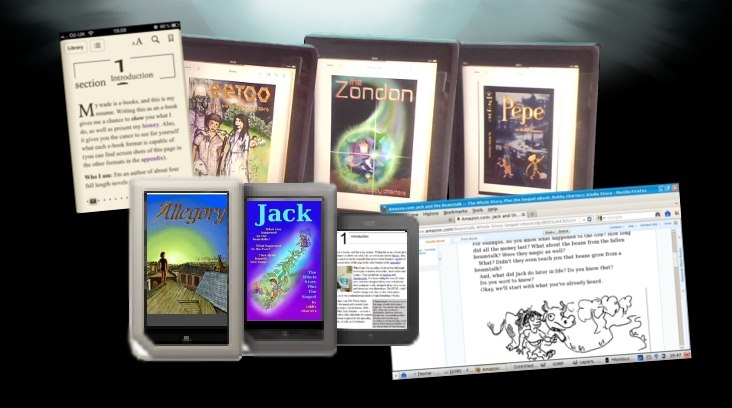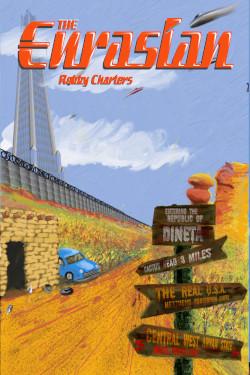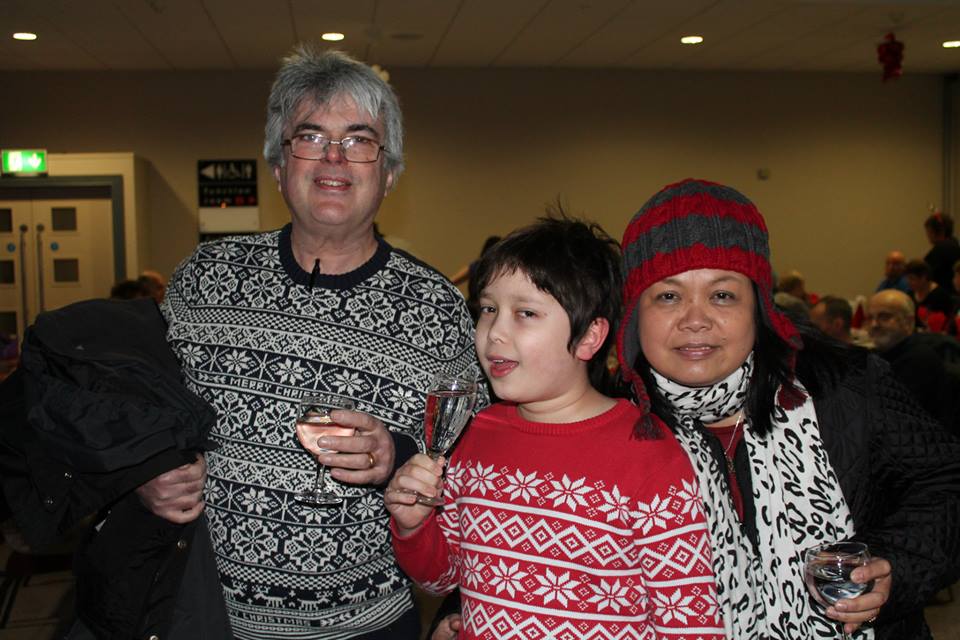my journey so far robby charters I'm not sure who will be the more interested in this, people who think I might have been a class mate, or heresy hunters looking for clues as to where I 'went wrong'. After looking this over, those are the only two groups I can imagine ploughing through the entire 32 or so pages. Anyway, I've tried to include something worthwhile for both groups. Last updated: April, 2014 My wife made the mistake of marrying an artist. Now that I've published a few novels, along with a few other types of literary work, it occurs to me that I may owe a few other people an explanation of who I am, and what makes me this way. In the next 32 pages of rambling drivel, I'll attempt to trace my spiritual roots. the faith of c.t. StuddI was born of missionary parents in Thailand. They belonged to a group called WEC, which now stands for World-wide Evangelisation for Christ, founded by C. T. Studd. He believed that if it were God's will for one to go somewhere as a missionary, God would also provide their expenses without them having to ask anyone for donations. He set the precedent himself and made it a policy in WEC, that missionaries not even leave broad hints regarding their financial needs, apart from the unavoidable submitting of plans for prayer. It worked for him and for my folks. To make matters worse, my parents didn't just settle for the relatively inexpensive task of church planting and the coaching and mentoring of leaders; rather, they felt the burden to begin a literature ministry as well. This also entailed printing and shipping costs. The only thing the newsletters could say, after the initial announcement of their intention was, 'Praise God for the response to our last issue, we are planning another one for July,' etc. -- no list of expenses, no letting on that the printers in Thailand don't provide their service free of charge, nor that postage stamps don't grow in our backyard. Yet, the money always came in on time to pay the printing bills and other expenses. Some dear granny in Ireland, England or America would feel the urge to send us just the amount that we needed, and it would arrive just a few days before, if not right on the deadline. It happened all the time. church – When I referred to the task of church planting as relatively inexpensive, that was because it was usual practice with the Thai WEC mission teams to begin with what we today think of as house churches. They would go to some village or other, where the gospel had never been preached and begin sharing via tract evangelism, open air meetings, children's meetings, house to house visitation, or even doing medical work (in the days before public health became widely available). Then, they would begin holding regular meetings in the home of whomever was the most interested. That's how the church started. The most mature members of the new group were soon appointed as elders, and the church would carry on with no budget -- no rent, no pastor's salary -- apart from a small offering taken to get whatever they needed, like song books etc. The missionaries and Thai volunteer workers would fill the pastoral gap by showing up on whatever day of the week was convenient for them, and giving foundational teaching. Thus, church wasn't always on Sunday morning, but it could be Tuesday, Wednesday, or wherever they fit on the worker's schedule. Every few months or so, local leaders would meet at some convenient location for training. That way, no one thought of themselves as 'reverend', nor deserving of a fat pastor's salary. They all continued to work at whatever they had been doing to keep themselves alive, in addition to feeding their flocks. It was only when some of them would meet pastors of other denominations at national conventions that they would hear how others did it, or fall prey to someone suggesting, 'Join us! You'll get lots of money!', and fall for the tragic misnomer that for a church to 'grow up', means to get a professional to do all the ministry that the members were doing before. denominations – Now, we would call them house churches. Then, they would have probably been thought of as resembling the Plymouth Brethren style of doing church. The missionaries themselves were from just about every group but the Plymouth Brethren (who had their own missionary organisation, and thought of the rest of us too liberal). The field leader, Uncle Wilf, was Lutheran, Auntie Ellen was Congregational, Uncle Art and Auntie Gini were Baptist, my mum was Presbyterian whose parents, Loren and Hazel Hanna, had previously been missionaries in Northern Thailand. My dad's background was a mixture of things. Only later did I learn that interdenominational-ism was associated with the Charismatic movement, but WEC was already so, even before Charismatics had anything to do with it. The Pentecostals and Charismatics began joining the field fellowship relatively late. Uncle Hans, from Holland was the first Pentecostal to be accepted by WEC Thailand. Later, there was Uncle Cyril who went to the same Bible School as Rienhard Bonnke, along with a few others. Even without the Charismatic/Pentecostal influence, there was still the sense of God speaking to people individually, doing financial miracles, and even a miraculous healing on occasion. Worship during the field conferences was something that could be felt, even without tongues and prophetic experience. Auntie Kaeomoon, one of the pillars of the Tak church had a sister so badly affected by demonic possession she had to be chained. Some of the WEC missionaries, including my parents and Uncle Hans, a new missionary at the time, prayed for her deliverance and she recovered. A few years before that, a young man was raised from his deathbed through a prayer by Uncle Wilf, Auntie Ellen and my Mother, all the while the men were building his coffin downstairs. Prayer, especially during annual prayer conferences, was fervent and mountain moving. For some Thailand WECcers, it was a very natural transition when the Charismatic movement made itself felt in Thailand. There were the usual dividing lines drawn, of course, but as time went on, the non Charismatics learned to live with the Charismatics, and vice versa. Even then, there was the occasional word in tongues with an interpretation. wec style communalism -- But now, I'm getting ahead of myself. My formative years were during the time when travelling back and forth from one field station to another was like visiting members of an extended family. It was almost a communal atmosphere. In Tak, there was the 'North House', run by Auntie Ellen, and a turnover of new missionaries studying the language, including a family or two, and others staying over on business. The 'South House', run by Auntie Hannah, was more of the same. Then, there was the 'Middle House', next to the Chinese school, at one point run by Uncle Art and Auntie Gini. I stayed there for one year, with their two daughters, Beth and Ruth, while Beth and I attended the little school run by Auntie Evy (wife of Uncle Wilf). I, and her son, Dan, were in the third grade together. That's just a snapshot in time. I began to recognise a pattern quite early of single uncles and aunties pairing off and getting married. I would notice that a particular uncle and an auntie would be together a lot, and then suddenly, there would come an announcement of their engagement. I don't remember it specifically, but I was told much later by Uncle Stan, that one day I went to him and asked, 'Are you going to marry Auntie Audrie?' He thought no one had noticed! They were married not long after. parent's background -- So, communal living that came with some aspects of the Jesus Movement later on, wasn't such a new thing to me. We were from all backgrounds: English, Irish, American, Canadian, Scottish, Welsh, Australian, New Zealand, Dutch, Danish, Presbyterian, Lutheran, Pentecostal, Baptist, Reformed -- My own family was a case in point. My dad was raised in a working class family living in a low cost housing estate in East Belfast, Northern Ireland. His conversion came while serving in the RAF during World War II, through Assemblies of God evangelists. He also received the baptism of the Holy Spirit through them. Then, back in Belfast, he went to the same church his mother took him to as a boy, a sort of Plymouth Brethren assembly off Cregagh Road, called Cregagh Hall. That continued to be his home church in Belfast. Then, after a two year term at Emmanuel Bible School, with a Wesleyan Holiness emphasis, he came to Thailand with WEC, where he met my mother. She had followed her parents footsteps in returning to Thailand. They were Presbyterian missionaries in the city of Lampang, Northern Thailand, where she was born. She had received a Masters degree, while my dad, at the time hadn't even finished secondary school (he later did completed that, and a master's degree through home study. That was long before cheap diplomas became available via Internet). My grandmother, whom everyone affectionately called Ma Hanna, had joined the WEC Thailand team after my grandfather’s passing, and was adding her valuable experience as a seasoned Thailand missionary. She was there for my parents wedding but had returned to the U.S. before I was born. My mother’s book, Cracked Earth, and Nancy Ashcrafts, No Turning Back give the history of WEC Thailand in full detail. I appear in both accounts as a very young person. The adventures of my grandparents in fleeing the Japanese invasion of Thailand, through Burma and Southern China were recounted by my grandfather, Loren Hanna, recently edited for publication by my cousin, Eric Wolf: In the Lion’s Jaw That's the WEC part of me. plymouth brethren and other influencesPlymouth Brethren also played a role in my spiritual upbringing. At fourteen years old, I was left to study in America. For the first year of that, I stayed with my Uncle Stan and Aunt Esma Hanna, missionaries to Honduras, who just happened to be on their one year leave (furlough, as missionaries call it) in Washington State. There, we attended the local Brethren assembly where I saw first hand “how it was done in Bible times”. I say that facetiously, but I also mean it. I still have a fond respect for them for attempting to do church the way they did it in the New Testament. How is it then, brethren? Whenever you come together, each of you has a psalm, has a teaching, has a tongue, has a revelation, has an interpretation. Let all things be done for edification. (I Corinthians 14:26) All that, apart from “the tongue”, was how it was done during the “breaking of bread” service every Sunday morning. I enjoyed it, and it felt like church. They didn't have a pastor, rather a group of elders who were native to the local community. I also learned other things as well, that I un-learned later on, such as had to do with tongues (which they said wasn't applicable for this day and age), Dispensationalism, and the limitations on women in public ministry. But the two aspects that I saw demonstrated in a positive way -- the involvement of the whole body in corporate worship, and lay leadership rather than a professional pastor -- stayed with me. After that, I moved to stay with my Aunt Claralice (my mom's twin sister) and her husband, Uncle Carl Wolf, a Presbyterian minister, whom my Plymouth Brethren uncle thought was a liberal. Well, okay, they did vote for George McGovern (gasp!), but with me, he was more of a disciplinarian. I needed it, of course. To be sure, he wasn't the fundamentalist that my uncle Stan was, but he tried to open my eyes to the fact that salvation goes a lot further than what happens at the altar during a meeting. The three years I was with them, my Uncle and Aunt directed a children's shelter in the hills of Eastern Kentucky, called Buckhorn Children's Centre. The institute provided a home and a semblance of a family life for children who had to be removed from their families for whatever reason, ranging from severe poverty, to parental neglect, to mild delinquency. I was only there during holidays. The first year, I studied at Stony Brook School for Boys. As my father in Thailand complained that the school fees were driving them “stony broke”, my aunt and uncle wisely decided (with my consent) to move me to nearby Annville Institute, where some of the Buckhorn residents also attended, also a boarding school situation. Thus, I spent my two remaining years of high school. About that time, my aunt suspected that I might be dyslexic. She expressed her thoughts to the dean of Stony Brook, and they had their resident doctor do a few tests. Sure enough… It was a more mild case of it, as I could certainly read - though a bit slower than what’s probably normal. It affected my motor skills, which was noticeable in PE. My social skills were also a bit behind, especially with my ever so slight speech impediment. Other kids would make fun of the way I talked. My maths skills were slow to develop. I also suspect that if Aspergers was a thing then, I would have been diagnosed with a touch of that as well. I’d be good at maths now, but then it was my worst subject. As for my speech, I still fail occasionally to use a tone of voice appropriate to what I’m saying, or what I feel. My mother was also dyslexic, as was her father. My mother, however, excelled in maths. While studying at Princeton Seminary, I’m told, she used to have long conversations with Albert Einstein while walking in the park. I understand he was also dyslexic. It took me a full two years to become the social animal I was at the end of my time at Annville Institute. Most of that time, I was my awkward self. I considered myself fortunate that PE wasn’t a required subject at Annville. The summer before my last year, I made a trip back to Thailand for the holiday, and stayed with my parents for two months. The Charismatic movement had arrived in force, and my parents had been attending the weekly meeting at the Eubank's home in Chiengmai where all the Charismatics in town met. Alan and Joan Eubank were missionaries working with Payap University. My mother had received the baptism in the Holy Spirit at their meeting, and my dad's RAF experience was revived. Then, I received it as well, coached by Auntie Jeanette, another WEC missionary. The WEC field fellowship was divided down the middle over the issue. However, they kept to their policy of working together and accepting one another's differences. That was back in 1973. formal education in a nutshellUp to that point, I had been to one school for every year I had been in school: My mother taught me the first two years. I had to repeat the second grade during our furlough in America, which was okay, because she had started me early anyway. The first school where I was in a class with other children was Troy Avenue School in Ventner, New Jersey. We stayed at an apartment complex for missionaries, called “Houses of Fellowship”. Everyone supposedly remembers where they were when they heard that John F. Kennedy was shot (well, okay -- some of you weren't born yet). I had just got home from Troy Ave. and some of my friends at Houses of Fellowship were talking about it. That brief period of my life is described in my short story, A Few Years in the Early Life of a Time Traveller. The scenes in which Boz appears are true to the best of my memory, except the last few scenes. Unfortunately, no one arrived from the future to patch things up, as happens in that story. Writing that was an act of atonement. The scenes not involving Boz are fictional – it is a time travel story. Any time a character named Boz appears in any of my stories, it’s me making a cameo appearance. In the middle of that year, we travelled to Washington State,where I finished second grade in the small mountain town of Carrolls. Then, back to Tak, Thailand, where I did third grade with my two friends, Dani and Beth, taught by Dan's mum. After that was one year at Dalat School, a missionary school that had recently had to evacuate from Dalat, Vietnam, as that war was just then escalating. Since the facilities, which they had located in Bangkok on such short notice, was way too small, they moved again over the Christmas break to the Cameron Highlands, Malaysia. Looking back on that year at Dalat School, I’m sure I had the reputation as the weird little kid, non sequitur, doing things off the top of my head, but I was slow and dreamy while doing my school work. After that year, WEC Thailand decided to start their own school in Bangkok. That was named Bethel School. Dan, Beth, Ruth, and a number of others ranging four levels, sat in one room while Miss Wenburg gave us our lessons. Bethel School makes its appearance in my novel, The Zondon, as Salem School (no allusion at all to the Salem School of Dickens' fame). We were there two years, until the WEC field fellowship decided it would be more sensible to move us all to Chiengmai, and instead of having a school, simply be a hostel so we can attend the already existing school, Chiengmai Coeducational Centre. My short story, The Last Shall be First, which appears in my collection, The Wrong Time, was written as atonement for how horribly we treated our youngest schoolmate at Bethel. That one isn't as autobiographical as the other, but I did model the character, Roger, after how I was then. Then, came our next furlough. I attended Roosevelt Jr. High in Glendale, California, while we resided at the C&MA compound for missionaries on furlough. After that is when I joined my Plymouth Brethren uncle and aunt while attending Montecello Jr. High in Longview, Washington. Then, of course, on to Stony Brook, then Annville where I finally got to keep my roots buried for two years. My education was thoroughly American, and that's how I acquired such a horrible accent! (That list, by the way, is for the benefit of anyone who thinks I may have been a classmate.) his house, new hope, etc.In 1974, my parents arrived on their furlough in time for my high school graduation from Annville Institute. From there, we drove to Southern California, where we visited my grandmother, now in a rest home for retired Presbyterian missionaries in Duarte. From there, we planned to drive to Washington State, to another old family homestead. However, I wanted to see more of my grandmother. I felt sorry for her being left alone in a nursing home. Someone suggested a local 'Christian house', a sort-of 'Jesus people' commune in Arcadia, called 'His House', not far from the rest home. They accepted me, and I moved in. Even though I had had my experience with the Holy Spirit the previous summer, the final year in high school had brought pressures and distractions which I hadn't successfully coped with, so I was almost in a back-slidden state when I arrived in California. The spiritual atmosphere of His House was just what I needed -- I knew I needed it, and was glad to be there. Occasionally, a group of us would trek to Calvary Chapel for their Saturday night free concert. It was at one of those, that my experience with the Holy Spirit was revived. The dry spell was over. His House was regarded by all its members as a 'church', yet there was no Sunday service. The residents along with a large number of non-resident members met on Monday and Friday night for praise, worship and Bible study, in addition to a Wednesday night "brother's meeting" for the residents. It was led by a group of about three or so elders. Most of the members attended other churches in the locality on Sunday morning, but some, including myself, didn't. I did occasionally attend weekly meetings at similar ministries, such as Canyon House, and Zion Ministries. I even popped into the local synagogue on occasion. While residing at His House, I began my first attempt at writing a novel. That was in the days before personal computers, and as I tended to make typos, I wrote it by hand -- not that my handwriting was much better. It was a fantasy, a sort of long rambling parable. During that time, I had trouble staying very long at a workplace. I lasted only a month each on two or three jobs, before the boss decided I was useless and let me go. After a while, the elders of His House spoke to me and Dan Redler told me that writing a novel wasn't good for my concentration. He asked me to give him my giant notebook, and he'd keep it for me until a later time. I never did get it back, probably because I forgot to ask for it when I moved to Anaheim two years later. I began taking courses at Melodyland School of Theology (MST), in Anaheim. At first I went along with others from either His House, or Zion Ministries, whoever happened to have classes there on the same evenings as I did. I got my feet wet in theology a la Dr. Tappiener (a Calvinist) and Dr. Rodman Williams (more of an Armenian), learned the Torah from 'Rabbi' Lou Sheldon, and I sat under a lot of teaching by Walter Martin. Those were the days before the organisation he founded became famous for heresy hunting – then, it was just the cults. But my favourite subject was church history, taught by Bob Whittaker, who had the gift of breathing life into it, and making it applicable to our time. My grades weren't very good, however. After the first year at MST, I decided to move closer, along with a couple of people I'd come to know. One of these was an older lady named Mary, who became like a spiritual mother to me. She became involved in a group that went on outreaches in the inner city areas of Watts and Compton. Out of that, emerged a new group, New Hope of Love (NHoL). It was intended to be a women's ministry, but in practice, there was just as much activity involving men -- mostly students of MST. One of our thrusts, apart from evangelism and personal ministry, was the uniting of believers across racial and denominational lines. We met often with pastors of churches in the black community, and joined them in door to door evangelism, and for crusades. The leader of our group was also named Mary, whom we occasionally nicknamed 'Chocolate Mary' while the Mary I lived with, the vice president, was 'Vanilla Mary'. Even though both Chocolate and Vanilla were also members of Melodyland Christian Centre, I considered New Hope of Love as my home church. I even paid my tithe to them. Another group I became involved with was called To Every Creature (TEC). Greg Fitch, an MST grad, and Bob Curry, former missionary to Brazil, were the leaders of that. The reason I mention them is, one of my few remaining American contacts from that era was from that group, Joe Zeyak. While NHoL was radically into penetrating racial and denominational barriers, TEC was just as much so for 'the regions beyond'. They gave me my send off back to Thailand, and later issued me with a certificate of commission for ministry, which I still keep to this day. I drew a few cartoon tracts which I published myself whenever I had the funds. One was an A4 size four-page comic with characters in the same style as Mad Magazine's Don Martin -- big chins, protruding bellies. It was titled, One Hot Afternoon On the Way Home From Work. It didn't have my name on it, only, 'Not by Don Martin.' The invitation at the end was of a 'try it, you might like it' sort -- not very heavy on repentance. Greg Fitch, president of TEC also commissioned me to write a cartoon tract that their teams could use. That was along the line of Four Spiritual Laws, with a few differences. There were other friends worth mentioning, fellow MST students and fellow troopers on numerous NHoL expeditions. Thomas Calhoun had a strong positive influence on me. He looked the part of a radical with his rugged black face with a beard. The reason for the beard was actually a skin condition. If he shaved, his tight ringletted hair would knot up under his skin. He was extremely outgoing in greeting people, showing the love of Messiah. Some, especially those not used to mixing with people of other races, felt intimidated by him, but he had a way of using that to open doors. He had a ministry of challenging nominal, half way Christians to go 'all the way', and give their 'all' to Him. I needed that at the time. I remember the date 7-7-77. The Christian radio station we were listening to was making a big thing of all the sevens in a row, being the number of God and all. I was in Thomas's car as the two of us were driving from California to Louisville Kentucky, Thomas' home. I had also grown a beard, so I also probably looked the part, and I had nurtured a one-track mind -- all for Jesus! On a ministry trip to the city park with some of Thomas' old contacts at the Lousiville Teen Challenge centre, one little girl approached me and asked if I was Jesus. Before we returned, someone prophesied over me that on my return, I would receive a word regarding God's will for me. Another one involved with us was Steve Sheppard. At the time Thomas and I returned from Kentucky, he was the NHoL emissary to Compton, where he was residing, working alongside one of the churches in our network. He later became involved in TEC, got married to another MST student, with whom he later went as missionaries to Mexico. He was very good with languages, especially Spanish, but had also studied Chinese and Japanese. He's still very much involved in missions, and I've recently reconnected with him via Facebook. Full of faith and energy, I was all set to join Steve in Compton, along with Thomas, but 'Vanilla' Mary nipped that in the bud. 'You are going back to work!' I was behind in my share of the rent and other responsibilities, and my excursion to Louisville hadn't helped matters! Apparently, that was the 'word regarding God's will' that had been prophesied over me as we left Louisville. I did a lot of growing up in those days. word of faith -- Another force I was exposed to was the Word of Faith movement. It was 'Vanilla' Mary, who initially introduced me to that. At first, I was a bit slow to wholeheartedly embrace the new healing doctrine. I wasn't sure, for one thing, if Yeshua's atonement at the cross actually included healing, or if Isaiah's reference to healing in chapter 53 wasn't just a metaphor. About that time, I read a book by Smith Wigglesworth, which pointed out that Matthew 8:17 refers to the passage in Isaiah 53 as indicating just that - healing through Yeshua's 'bearing our sickness, and carrying our diseases'. I looked it up. Sure enough, it did! Then, at an early morning prayer meeting, my nose dripping like a tap, Thomas Calhoun said, 'Now, Bob, don't you leave here without your healing!' Something about how he said it sparked faith in my spirit. I said, 'Okay,' and by the time I left that house, I was healed! Gradually, through more seminars, tapes and books, and seeing it work on a few more occasions, I was a confirmed 'faith' man. off to thailand, and the faith of my parentsAfter a send off by both NHoL and TEC, I set off to Thailand in 1979 armed with pamphlets by Kenneth E. Hagin. However, this was not a new thing to my parents. As I said, WEC is also a faith mission, and C. T. Studd was every bit as radical for his day as Hagin, Copeland and others were in 1979. With the faith taught to them in WEC, they got their leaflets off the presses and food onto our table. However, they didn't have a car in the early days, but went around on bicycles and public transport. Looking back, I can see that their leaving me in America to study wasn't simply a convenient move on their part (as some would say, to get me 'out of their hair'). They released me by faith. I believe it was that faith that saw me through for many years. Sometime later, my dad began listening to tapes by various Charismatics, including Kenneth Hagin, and was motivated to begin believing God for more than just the basics to survive. Soon, he was driving a second hand pick-up truck. About that time is when I returned to Thailand, having been filled to the brim with the uncompromising Word of Faith message. However, I was dismayed that while my parents accepted the 'faith message' for the most part, there was a margin of 'compromise'. It verged on being 'C. T. Studd' type of faith instead of 'Kenneth Hagin' faith! Maybe, they thought, God might use sickness sometimes. Definitely not! I said. Also, they'd pray many times for the same thing. No! I'd say. You pray the prayer of faith only once! After that, you're praying in doubt! I had a lot to teach my parents, if only they'd humble themselves and listen! My faith knew no compromise. So I thought... In retrospect, my dad's faith actually bore more fruit. Even after retirement, at the age of 80, he would spend only the warmer half of the year in his home in Northern Ireland, but the cooler half in Thailand, translating gospel tracts and Bible courses like before. At 86, he made his last trip. God may use sickness to teach some people, but not him! What's more, just about every computer I owned up to that point, I inherited from him! As for my mother -- while I preached a lot about the power of prayer, she actually had the self-discipline to do it. She was up regularly at five every morning, interceding for the churches in Thailand and elsewhere, her fellow missionaries, and for my dad and me. She didn't go in for luxuries. She finally started wearing a nice wrist watch when my dad bought one for her and all but forced her to wear it. Every time my dad talked about buying a new computer (which he often passed on to me), my mother would say, 'You need a computer like you need a hole in your head!' Much later, my dad conceded that she was probably right. My parents were staying in the town of Kanu, when I joined them. I didn't stay put, however. I made friends here and there, traipsed off to places like Chiengmai, where my parents knew quite a few people from their years living there. In Bangkok, I made friends with Assemblies of God missionaries, and through them, I met Rod and Debbie Ritchie, missionaries with Church of God. They, along with some of the AOG missionaries were also 'Word of Faith'. Joe Zeyak, my fellow student at MST, came out to visit Thailand. I took him to visit all the missionaries and pastors I had made contact with. He also introduced me to a group of Filipino missionaries with a group called Christ to Thailand. Joe had met Sonny Largado in the Philippines on the same trip, and later introduced me. All the while, the Thai language was returning to me little by little. I would memorise Bible verses in Thai, and spend a day at a time working on sermons to preach in Thai based on those scriptures. Besides my packet of Kenneth Hagin pamphlets that I read through, I found a copy of E.W.Kenyon’s The Bible in the Light of Our RedemptionI in my parents’ bookshelf. That being a foundational work for the Word of Faith movement, I studied through it, and that confirmed me in my position as a ‘Faith preacher’. Though I wouldn’t currently describe myself as a disciple of E.W.Kenyon, that book did influence me as being an example of a set of study guides focusing on a central theme through the whole Bible. That inspiration has resulted in my recently completed series, The Shechinah: it’s all about God Dwelling Among Humanity. Maybe just a couple of Kenyon’s ideas might be notice in mine, such as the concept of covenant. Where Kenyon might be accused of being too heavily influenced by Christian Science, I could likewise be toward Rabbinical Judaism. But in those days, I was a follower of Kenyon. I saw in his teachings, the ideal answer to many of the unique questions posed by Buddhism. I also did more tract design, which fit in with my parents’ literature ministry. Among other things, I did a comic book style tract, depicting two people in conversation, one asking all the right questions and the other explaining it all with the aid of diagrams and illustrations. It was a Kenyon/Word of Faith style presentation, and included a bit about Jesus suffering in hell. My parents were okay with it. My mother had been translating Bilheimer's Destined for the Throne. That had a reference to the same issue, which became a controversy as it was about to be published. My mother edited that bit so as to keep peace. I wasn't as concerned about peace making in those days. After my Thai had improved, my parents decided to turn me loose on a small group of new believers not far from us, mostly contacts provided by a mission hospital a couple of hours drive away. A young man named Wirote joined us. He had begun believing in a different part of the country, and had moved to the village his wife lived in. Since he was my age, we hit it on. One day, after I had been reading Kenneth Hagin's pamphlet on the Holy Spirit, I decided to take a leap of faith and teach on the subject, and lay hands on the believers to receive. Despite never having done it before, I told them to expect something when I laid my hands on them. To my surprise, Wirote's lips began shivering, and he began speaking in tongues. On a trip to Bangkok, I had obtained some books by T.L.Osborn that had been translated into Thai, one on healing. I passed that one to Wirote. On weekdays, he went to work in another town, where he slept at the workplace. One day, his boss's brother came by, who had a severe ailment – I've forgotten what. Wirote showed him a page he had been reading, and offered to pray for him. He did, and the man was healed! After that, Wirote began to operate with the gift of healing. Closer to home, some school students who resided at a hostel for students whose homes were too far to travel every day, began dropping by. Living with them was a young man who was doing work for the local utilities. He had a fiancée who believed, who lived in his hometown in another province. With minimal persuasion, he and some of his companions believed. They began coming to our house regularly. I'm sure that between the two ministries, had I chosen to stay put, I could have gone a long way. As it was, my attention was drawn elsewhere. It was my Word of Faith sympathies that prompted me to accept Rod Ritchie's invitation to assist him in his church planting venture in Bangkok. This eventually led to my officially joining Church of God and receiving credentials as a minister. A semblance of a church began, and I stayed at the house they had rented for that purpose. Later on, Rod invited a Thai-Chinese Christian worker to work with us, named Somnuk. He had some ministerial and clerical experience, and was engaged to Lily, a young lady from Hongkong. During that time, I first met Duane Kleppel, who had recently come to Thailand with his family. Previously, they had been in Israel for two years. He was one who practices listening to the voice of God for direction - thus, the route he had taken, with two sons and two daughters, through Israel, and then Thailand, and eventually Australia. Among other things, God told him to build a boat. He wasn’t interested in boats. He had a pilot’s licence, and could fly a small plane, but a boat was a new learning curve. The purpose was to serve as a sign of possible judgement on Thailand, the idea being that he and his family could flee at a moment's notice. He did build it, it attracted a lot of attention, lots of tourists visited him, and so it was his opportunity to spread the Gospel of the Kingdom, which he was good at. The said judgement didn't come during the time he could use the boat for that, but it could have played a part, in tandem with warnings from other sources, of delaying the judgement, as Jonah’s prophecy did for Nineveh. His boat wasn’t called Johah, but “Noah”, who had also built a boat. Another instance of hearing from God was right after he had advised his two daughters against considering marriage to someone of a different culture than themselves, such as a Thai. He then made a trip to Bangkok, where he met Tosh, a recent graduate of Christ for the Nations Institute in Texas. He also knew how to listen for God’s voice. When they met, Duane had a rather awkward leading from the Lord. They had lunch together and it appeared that God had given the same word to both of them. Tosh was to marry Duane’s daughter, Dawn. They did. Tosh officially joined the organisations (the registered charity as recognised by the government), and a few years later, they started a Bible training school in the town of Sriracha (the same city that’s famous for the sauce). While working in Bangkok with Rod for that year, I had the chance to get to know them, and visited them a few times on their boat, in which they now lived. To pay them a visit you had to go to the shoreline where their boat was moored near Pattaya, and call out, “Ahoi Noah!”. They’d come to fetch you in a rowboat. They also had the gift of hospitality. church of godAfter one year with the new Church of God work in Bangkok, Rod suggested I go back to school to finish my degree. He suggested a Church of God institution in Fresno, West Coast Christian College. I would have preferred to go to Rhema Bible Training Centre in Tulsa Oklahoma, Kenneth Hagin's school, but in retrospect, I'm glad I settled for WCCC. I touched base with my friends in Southern California, and I stayed for a while with my old NHoL friends Steve and Christie Sheppard. Steve had a painting business, but they were planning to move to Mexicali, just South of the border in Mexico. I had been there once on a ministry trip along with a large team consisting of NHoL and TEC friends. During the two and a half years I was back in U.S.A., I renewed acquaintance with a number of my old friends, including 'Vanilla' Mary, Joe Zeyak and Bob Curry. On my term breaks, I visited Southern California on a few occasions. I also made some friends in the Fresno area. One was a day student, who lived in a small town just outside of Fresno with his 10-year-old son. For a part of my first summer, he and I worked in the fields doing temporary labour as described in my novel, The Zondon. After a year and a half, I almost completed a Bachelor's degree at WCCC. I was actually a much better student than I had been at MST. I had completed the Biblical-Theological course requirements, but lacked courses in the sciences, etc. However, I didn't like the idea of accumulating more debt though my student loan. I opted to go to work in Southern California. During that time, I drew a few more cartoon tracts and published them as I had the funds. These ones reflected my Word of Faith approach. One was titled, The Good Life is Yours for the Taking. Again, there was not a lot of emphasis on repentance. Meanwhile, Rod and Debbie Ritchie had taken their first furlough from Thailand, and had decided not to return. They had turned the new Bangkok church over to Pastor Somnuk, whom Rod had invited to work with them. After that, Pastor Somnuk decided to accept an offer of a scholarship to study at a Korean Presbyterian seminary in California. By now, Rod Ritchie was pastoring a church in Simi Valley, California, not far from the L.A. area, the same church his dad had pastored. Thus, unknown to me, all three of us were in S. Cal, while the Bangkok church was nurtured through visiting speakers every Sunday. After we got back in touch, Rod recommended to the Far East Superintendent, Rev. Lovel Cary, who in turn, recommended to the Church of God missions board that I be appointed as a missionary, post haste, and sent to Thailand. They agreed. Thus, I was appointed as a missionary by the missions board in Cleveland Tennessee. I arrived in Bangkok a few days after New Year, 1984. The meeting place had been moved from the north of Bangkok, the building I once occupied, to the 11th floor of a highrise apartment complex. It was flush against the expressway, so there was constant noise from engine mufflers of every variety and condition. The congregation was made up mostly of the two brothers of Pastor Somnuk, and a few other members of a church they all used to belong to, plus a couple of Bible school students whom Rod Ritchie had accepted as student interns. The church that Somnuk and the others had previously belonged to was a Baptist congregation, in which the pastor had been attempting to lead them into the fullness of the Holy Spirit. However, his own life lacked moral discipline, and some of his ways were over the top, This finally led to a traumatic end of that congregation. For that reason, the congregation I began to pastor at Plukchit church was sceptical of anything beyond a standard Baptist format. It was a difficult congregation for me to lead. A part of that was probably due to my gifting not being suited to that situation, but I’m sure I could have made it go farther with a bit more maturity and discipline. The church did grow some during the following year, but when Somnuk completed his degree and returned a year later, his style of leadership was exactly what they needed, and they began to take off. But I’m getting ahead of myself. The name of the congregation was Plukchit, after the name of the street where we were located. It was a great name for a church, meaning, “planting hearts”. The name of the highrise community was Bon Kai, meaning “cock fighting den”, probably not an appropriate name. Plukchit also became part of the official name of Thailand Church of God, though it wasn’t the first congregation. The original Church of God congregation in Thailand was established in Udon during the Vietnam War era, in the same town as the US army’s listening station, which listened for radio signals in the region during the War. The leftover aerials had the look of a radio telescope. Charles Austin was a U.S. Army officer who had also been stationed in a few other parts of the world, and was instrumental in starting congregations in each place. He had helped start the one in Nonsoong, just outside of Udon Thani. However, by the time I first visited it, it was hardly more than a children’s Sunday school. Charles Austin promised to help support anyone who would take on that church, as the one he left in charge, Suan Boonarong, was getting old and ready to retire. When Yothin, one of the student interns, graduated from Bible School, we sent him to take over that work. I made a lot of trips there to help coach and mentor him, as well as preach to his developing congregation – mostly old folks who had been healed of various ailments. Yothin’s hometown was in the farthest province of N.E. Thailand, Nakhorn Panom. His old pastor there sent his son, Tawee, to be apprenticed to Pastor Yothin. We decided to send him to a three month Bible training centre in Khonkaen, run by Christ to Thailand, the Phillipino mission that I had met through Joe Zeyak. Just when he completed that, Tosh and Duane’s Bible school was starting, and we decided to send Tawee and a fellow student, Tawon to study at Christ for Thailand Institute (CFTI). I am, again, getting ahead of myself, but just to finish off this stream in my story: I had the opportunity to teach there a number of times as a guest speaker while they were in Sriracha. So did Pastor Somnuk. Through CFTI, he also gained a few workers for the Bangkok work. After Tawee completed his two year course there, he was asked to replace Pastor Yothin in Udon. Yothin was assigned to a church in Lak Si, in the north of Bangkok that had just sprung up as the result of a crusade. He was married by then, and his wife, Karen, was about to give birth to their first child. Pastor Tawee eventually married a fellow graduate of CFTI and they have been leading the Udon church ever since, and doing a great job. Now, to pick up where I left off in 1984 - early 1985: Another Bible school student who came to join us was Wichai, whom Yothin introduced to us shortly before heading to Udon. After prayer, I decided to ask the church to take him on as well, which they did on my advice. Wichai talked me into sponsoring a young lady he had discipled, to study at a Bible school. I recommended the YWAM Discipleship Training School (DTS) that was just starting in Bangkok. On one visit to Plukchit Church to help with visitation, she brought along a classmate named Pontip. Pontip was from Panatnikom, in Chonburi Province, where a YWAM team was based so as to do work at the large holding centre for refugees from Cambodia. She had come to the Lord as the result of interaction with volunteers at the YWAM base. Later, she went to study at the DTS. So she came with the young lady I was sponsoring. Her English was quite good, and kept trying to practice that on me as I was trying to show off my Thai. Nothing else significant happened there, but I inserted this information because she was to have an important part of my life much later. church planting, kuiburi and beyondAbout that time, my parents were asked to look after a missionary retreat/holiday centre in Huahin, called The Juniper Tree, as Ruth Wilson, the hostess, was due for her one year furlough. I made regular trips there every week, as I had volunteered to transport the weekly shopping in my dad’s Daihatsu, which he left with me for that purpose. On one of those trips, Wichai went along with me so as to introduce me to his sister who lived further south. He took me to his mother’s farm outside the town of Kuiburi, where his sister Nit lived with her husband Daeng. Nit was the only believer in the area. I began visiting them from time to time after that. My dad was glad for his Daihatsu to be used for this purpose. Once, when Joe Zeyak was in Thailand on a visit, I took him there. On that occasion, Daeng responded to the Gospel and became a believer. The following year, on Chinese New Year, Daeng told me that up to the previous year, he’d get so drunk on Chinese New Year that he often woke up in the hospital. Now, he had lost his desire for the drink. During a Plukchit retreat to Pattaya, we had a baptism service in the sea, and Daeng was baptised. He decided to stop smoking then, and never smoked again. By then,Pastor Somnuk arrived back in Thailand, and had taken over the leadership of the church in Bangkok. I gave my full time to ministry in Kuiburi and in Udon. My work in Kuiburi was the experience that defined my five years as a missionary. A friend of mine, Doug Gehman, then living in the town of Huahin had a crusade ministry, mostly in Sri Lanka, where he’d make trips. He had been introduced to me by Wayne Crooke, who also had a crusade ministry, mostly in Thailand. He had held a crusade for a church located between HuaHin and Kuiburi, with which we helped out. The Pastor of that congregation agreed for me to visit some groups of the new believers that were not far from Kuiburi. I took Daeng and Nit on weekly trips to visit those groups, which began to grow. We also held a baptism service at one point. Also, they’d join me in evangelism at the local weekly outdoor markets. At one point, as Daeng related later, I was presenting the Gospel message with a picture chart. He saw they were passively interested. Then, I shocked him by asking him to give his testimony. He did, and he was surprised by how they perked up as he began sharing his personal experience since coming to the Lord. That was him getting a jump start in ministry. I had been given a copy of a book titled Church Planting Methods, by David Godwin, in which the author tells of how he started churches by holding a crusade in a city that would go on for months until it evolved into a church. I decided to try it. I had been working with Daeng and Nit now for almost a year when Doug Gehman agreed to hold a five day crusade in Kuiburi. We obtained permission to use the unfinished market shelter, and I rented an old termite eaten house nearby for very cheap. The crusade went as planned, although with less turnout than we expected. However, among those who were turned on were a young farming lady named Mem and her sister, Pua. Mem found a leaflet advertising the meetings, and had come to be healed of high blood pressure. After that, she confessed faith, and then went home and prayed for her father to be healed. He was healed, and she was a confirmed believer. After the meetings were finished in the market shelter, we carried on in the wooden house. Mem had a number of friends she thought ought to come, and took me in my dad's tiny Daihatsu pick-up to fetch them. In addition to them were a group of old ladies who lived within walking distance, and began coming regularly. Every night, I shared the word, and then we prayed for the sick. The effect of doing it every night for a protracted period was just as Godwin said in his book. The atmosphere, the nightly prayers for healing, the continued teaching and preaching of the word infused an energy into the new converts that went much further than a weekly visit. At the end of forty days of meetings, we baptised twenty converts. Again, I was driving my dad's car, that he had had the faith to buy -- brand new this time. However, it wasn't in quite as mint condition when I was finished with it. There were the dents from the rocks. I had been studying the life of the Apostle Paul, inspired to follow his example and become just like him. The first time that rocks began to fly at the car from out of the darkness in middle of nowhere, on the way back from dropping everyone off, I said, 'Lord, I don't have to be exactly like Paul!' Then, there were the nails in the road. One day, I had to make an emergency call to my parents, living in Huahin, and they came, bringing two new tires and some inner tubes, because the local garage didn't have them in the smaller size required for a Daihatsu. My dad didn't mind the dents in his car, as they were for a good cause. Then, help came from an unexpected source. Mem had become a prayer warrior, and told me, the next evening, 'I believe you should go home by the long way tonight.' We did, and there were no rocks or nails. The following night, she felt we should go in the long way, and return the short way. Again, no rocks. There were other problems with the car as well, such as with the fuel pump. Even that was our salvation one night. On the way home, this time with Nit and Daeng in the front with me, the car died. Nit felt like we should just stay put for a while and pray. A white sedan overtook us (the Daihatsu was also white). We heard something that sounded like a shot. As it turned out, the people who had stoned us on previous occasions were waiting with a gun, but mistakenly shot at the sedan. No one was hurt, but the owner of the sedan was very upset at the perpetrators. Some time after that, some unpleasant things befell that group of young men, which everyone attributed to having 'touched God's anointed.' I reserved comment, and still do. Another more positive miracle was that Pua, Mem's sister, began reading. I didn't know she couldn't read, so during a Bible teaching session, I asked her to read a verse from the Bible. She did! This had also happened to Nit's cousin some months earlier, soon after she had believed. It was a great experience. A church was birthed. Because it was a difficult area, I believe this was the only way it could have started. However, I must say now, if I had it to do over again, I would probably emphasise repentance a little bit more. Our invitation was more like, 'try it, you'll like it'. We said it wasn't a matter of changing religion, but embracing Yeshua. However, by not being more specific on what it meant to embrace Yeshua, some took it that they could attend both the Buddhist temple and church. To do it the hard way would have made the initial results look a little bit less impressive, but could have made for better quality Christians. But you couldn't have told me that then, of course. At one point, as I was teaching the Kuiburi leaders, I noticed Mem had her eyes shut. She later said there was a light radiating from my eyes as I spoke. Looking back, I don't think I had the humility to handle the power we seemed to be moving in without going off the tracks somewhere – which I did, but rather gently by God's mercy. thabsakae – Our success in Kuiburi had inspired me, and I determined to see more of the same. I quickly developed a vision for a vigorous crusade/church planting ministry that I hoped would multiply as it went. It would involve low budget crusades in low rent locations, like we did in Kuiburi, and workers would be trained, some to be pastors of the new works, and others to eventually be released to a similar ministry. Thus, the crusade team would multiply itself, and so would the churches. It would be a low budget operation, not because I thought I lacked the faith for a big budget, but because I wanted to do it in a way that local people would readily see as something they could do themselves with the resources they had. Thus, it wouldn't be dependant on an income from overseas, as most mission work was in Thailand. With this in mind, I opened an outreach centre further South in the town of Thapsakae, in the same province, hoping to repeat the success we saw in Kuiburi. Instead, we were bogged down with problems which I didn't have the backbone and the self discipline to deal with. Things seemed to look promising at first. Our experience was replete with dreams and visions. Mem went along on the exploratory trip, and a vision of hers seemed to indicate an empty house on the edge of the main highway, which we ended up renting. However, there were other things received that had we taken more heed, could have helped us to side-step other problems down the road. When we moved into the house, we found a homeless 11 year old boy named Tdee who had been sleeping on the premises. Some time before that I had been inspired by a short film by the Salecian Fathers, on their work with homeless children in Columbia, titled Gaminos. Tdee fit the profile of the fiercely independent homeless children described in that film. He stayed with us a week, before running away -- but not before capturing my heart and my imagination. I've had a corner of my heart reserved for homeless street children ever since. They've shown up in a few of my novels, including Pepe, as well as in The Eurasian, in the character of Annie 'ol Iron, and Louis in Rats in the Cellar, and a few more in the Rat Queen series. In Thapsakae, I was assisted by Nit's brother Wichai and his wife, who took up residence in the outreach centre. Tawee, who was still a student at CFTI, joined us as he was doing practum over the holidays. We advertised nightly meetings with healing, but hardly anyone came. Through other evangelism methods, we saw a small amount of fruit in Thapsakae, mostly with individuals, some who disappeared again. We did see progress and growth with the church in Kuiburi, we did crusades and such, but my goal of vigorous miracle church planting never got off the ground. Among those who did pop into the centre was a Presbyterian pastor and her husband. Rachue and Uthai, a Chinese couple, had started a small church by the seaside. They were somewhat at odds with the main Presbyterian church in the town, and they readily showed their enthusiasm for our endeavour. In those days, I was of the attitude that as long as I was at the cutting edge of God's agenda, as my experience in Kuiburi 'proved', I had every right to zoom on ahead with it, leaving everyone else choking in my dust trail. Therefore, the less than amiable relationship between us and the local Presbyterian parish didn't bother me very much. Wichai was also an artist, and aspired to be a comic book writer. He felt inspired to redo the comic tract I had written while in Kanu (which I described earlier). His drawings were superb, and he also decided to expand and flesh out what I had done. However, in retrospect, the project went sour in a few ways – a disaster, in fact. First off, had I thoroughly read all of what he added, I would have corrected him on it, as there was at least one rather weird idea that was beyond being theologically incorrect – just weird. That was on top of the fact that it still reflected the doctrine that Jesus died spiritually (which I now no longer follow as I did then), and even included a picture of Jesus in midst of the flames. It was a blatant, in-your-face display of that doctrine – or would have been had not the quality of the finished product been seriously compromised. The publisher decided it should be in colour and asked the printer to add it in. Instead of making a copy of the original and watercolouring over it, the printer copied the drawings by hand in a more cartoony style that fell far short of the quality of Wichai’s drawings. The difference was laughable – or would have been if it didn’t make me cringe. Wichai was also disappointed and was glad his name didn’t appear on the cover. Mine did! It sat for years in the CLC bookshop, with my name on the cover – maybe my thorn in the flesh? Among our more productive activities of that period: I began a program of teaching and equipping for the benefit of the leaders in both Kuiburi and Thapsakae. Often I included Pastors Rachue and Uthai as well. On one occasion, when Barry McKnight, then residing in Huahin, came to teach, Uthai received the baptism of the Holy Spirit. Rachue, his wife had already been moving in that way before we met them. In 1988, Judy Hayden, a YWAM staffer, asked me if I could host a number of visiting YWAM teams that were scheduled to visit Thailand, which would have been a strain on their workload at that time. Two of them were FEAT teams that specialised in outdoor drama and dance. One was a group of staff and students that had completed a DTS in Southern England and would be stopping on the way back from the Olympics in Seoul, Korea. I knew the locations of a number of weekly outdoor markets in my area, and the days they were scheduled, and had hosted YWAM teams in the past. I also solicited the help of Doug Gehman, and he scheduled a few crusades in our area, at which the YWAMmers would also perform. So, almost every morning, they’d perform at outdoor markets, and then buy their breakfast from the sellers. Everyone’s favourite was a large pancake-like pastry with shredded coconut sprinkled in it, called tang taek. We would also advertise Doug’s crusades, and also perform on stage in addition to the preaching. Two of the teams also accompanied me north to Udon, where Pastor Tawee took us to various places. The team from Holmstead Manor, England had done a lot of prayer, and had specific goals concerning their ministry. They especially wanted to go to where there previously were no believers. Tawee took us to the village of Chieng Weh, that he had been targeting. The team did some of their open air drama and gave their testimonies. The following month, I returned with another YWAM team, this time from Hongkong. This time, there was a cell group in that same village. Another visiting YWAM team, this time a HANDS team that specialised in construction work, rebuilt Uthai and Rachue's meeting shelter by the sea. One person who accompanied a couple of YWAM teams, including a YWAM Discipleship Training School (DTS) from Bangkok, was Pontip (a.k.a. Bless), whom I had met a few years earlier, when she herself was a DTS student. Again, though it didn't seem so at the time, these meetings were significant. Wichai and his wife, whom I had been working with, were having severe marriage problems. Also, relations between him and Uthai and Rachue weren't good. Eventually they moved away. Meanwhile, Uthai and Rachue decided to move their work from the seaside to the main highway near our outreach centre. The fact that they would have been so close to us, didn't seem to me to be a good thing. I proposed that we merge our work, which they agreed to do. The only problem was that I was a salaried missionary with Church of God, and therefore under obligation to keep whatever work I did within the context of Church of God. Uthai, in the meantime, went for training with Hope of Bangkok Church, with the intention of making our work a Hope of Thapsakae Church. cutting loose – That was probably the initial reason I began to consider resigning from my missionary appointment. Other reasons included the fact that I was caring for a child whom I hoped to adopt. Church of God missions policy forbade single parent adoptions. Another factor, which I now see as the more legitimate reason for my decision, was the conflict between my position as a salaried missionary, and what I was encouraging the local workers to do. Certain ones were always complaining that their monthly support wasn't quite enough, and were asking me to try to get the head office in America to increase it. I, with my WEC influence, was loath to see an increasing dependence on foreign support, and tried to encourage them to be more resourceful and exercise faith. However, I was living on a missions salary myself, which was far more than what they received. Was I exercising the same faith that I was asking them to do? Daeng and Nit were not among those who required a salary, nor did they ever request it. Though they made their home in the meeting centre, they also did things like selling vegetables from Nit’s mother farm in the market, or taking temporary jobs, or raising pigs. They gained Bible training through the seminars I set up, as well as going off to a short term Bible School in Chiengmai once, while I minded their two boys, sometimes staying in their place. On the other hand, I was paying the rent in Kuiburi (albeit very low), as well as Thapsakae, for my own flat in Bangkok, and my foster child's school fees. This was a drain on the income that I had, and it wasn't increasing. It looked like I was at an impasse, and that I needed to do something radical to get me over into living by faith instead of dependence on something that wasn't enough anyway. So, I resigned from my missions appointment. They kept me as an associate missionary, as I was still in good standing. I didn't join Hope of Bangkok church though, so I was left in limbo for a while. hitting bottomI now believe the decision to resign my appointment was right, although the timing of it may not have been the wisest. Even then, my savings, plus some generous gifts that came later, would have got me through had I not made a very bad move. I had been becoming interested in financial investments, especially the commodities/futures market. I thought I saw signs that I was hearing God's voice -- rather, premonitions of how the market would go. Once, I thought I saw a very steep mountain, with cliffs on both sides. After spending one day at a brokerage house, I noted that the chart for that day's day trading resembled that mountain. I could have made a lot of money by doing a long position on the up side, and then a short one on the down side. So, I sank what savings I had into the futures market -- that and an overdraft. A few months later, I was burnt out and in debt. That, of course, was the consequence of unbridled freedom, and the lack of accountability to anyone. Then, I fell prey to the opposite extreme, abusive control by leadership that I didn't dare contradict because I believed they spoke for God to my life. After I quit the futures markets, I spent some time working with a friend who was the national president of Full Gospel Businessmen's Fellowship, and also had a greeting card business. I had already been involved in his FGBMFI Bangkok chapter for a couple of years before that. There, I had a chance to develop my computer skills, and gained experience in administrative work. Just after I started work, my mother was diagnosed with cancer of the liver. It was also in her lymph nodes and the bone. She took radiation treatment to get rid of the cancer in the bones but she turned down Chemotherapy, as that wouldn't have saved her anyway. She passed away six months later, and was buried in Chiengmai. The funeral was well attended. Besides being a prayer warrior, she had been an encouragement and inspiration to many, both in and out of WEC. My foster child was at the funeral, and cried for her like she would a grandmother. They had become close. Later, it became more and more clear that I must find a new family for her. I wasn't financially prepared to give her the care she deserved, and she would soon be growing into her teens. I'd be no match for the peer pressure she'd encounter. She had been staying with some of my other friends, whom I had hoped could take more and more of the responsibility, but that didn't work out either. Some old WEC friends in Tak knew of a rural family who had been wanting to adopt a daughter, as the wife couldn't give birth. It worked out just right, and she went to live with them. Releasing her was a painful decision. That, my mother's death, my financial failure, and the fact that I was following a leader who thought he knew me better than I did; all contributed to the rock-bottom state I was in. One factor that began bringing healing to my life, later on, was the practice of journaling, simply listening in prayer to God's voice, and writing down what comes. I received some beautiful words that way, straight from the Father's heart to me. Also, a book by Roberts Lairdon particularly ministered to me, Controlling Spirits, helped me understand the bondage I'd been under. Another healing factor in my life was my friendship with Dr. Joy Seevaratnam, in Penang. A lot of what I know about the power of releasing, and of the importance of relationships, I received from him. About this time, I read an early version of Rick Joyner's Visions of the Harvest. It planted a seed in me that began to bear fruit later on. A few months later, my father asked me to help find a buyer for his car and use part of the proceeds to pay off my bank debt. He went on a furlough to Ireland. I joined him later on, spending three months with him in Belfast. After he returned to Thailand, I took the job of minding a compound that WEC was trying to sell, in Bexhill-on-Sea, on the southern English coast. englandWhile I was in Bexhill, someone mentioned to me that they knew Jack and Ingrid Casson, who had previously been missionaries to Thailand. I remembered that once, as a child, on a family holiday in Prachuab, we paid a visit to them. Jack was now pastoring an Elim church in Manchester. I got in contact with him, and he was overjoyed to know that I had started a church in Kuiburi. Jack and Ingred had sown their prayers and tears into the Kuiburi and Prachuab soil for years without seeing any fruit. I knew from that that their prayers were a big part of the secret to my success there. Jack was overjoyed to hear that a church had been started in the town which he had attempted to evangelize, and that there were now churches in every district of Prachuab. It meant a lot to me to meet Jack and Ingrid again after sharing in their harvest. While still minding the WEC house Bexhill, I had a small amount of cash to keep me for a while. I went as often as I could into London to attend Kensington Temple. I also did research on my project, The Emissary. The Emissary was my personal journey into the Jewish roots of the Christian faith. The rough form of the book took four to six months to complete, but I continued editing and doing research on it over the next 12 years. It probably constitutes a whole category of my spiritual development and education. The idea for it was an outgrowth of both my journaling experience, and my study of the book of Ephesians with the idea to gain a perspective on Paul's revelation. The seeds of that were my interest in the life of Paul during my Kuiburi days. The theme of release and dying to one's own agenda, learned from Dr. Joy, also figured prominently. Another aspect was what began with my experience with Tdee, the homeless boy, on whom I based one of the characters. It was a fictionalised account of Paul's second missionary journey. To make it more historically authentic, I began doing research on daily life in the Greek and Roman world. Then, on seeking the advice of Jacob Prasch, whom I'd met at a FGBMFI convention in Brighton, he gave me a reading list which led to more research into the first century world of Judaism, both rabbinical and otherwise. This field of study now goes under the heading of "Jesus Studies", and "New Perspective on Paul". The original version of my book read almost like a narrative sermon in places. It was called The Apostle then, but I later purged it of all 20th century Christian terminology, trimmed off a lot of the homiletics, and now it sounds much more like what an adventure novel should. As I said, it was a twelve year journey, in which I studied a little bit of Hebrew, read rabbinical commentaries, parts of the Talmud and various midrashim, what secular scholars say about that period of Church/Jewish history, and what's been applied by the Messianic Jewish movement. It took me to the local synagogue in Bangkok where I was invited to Shabbat supper with the rabbi on a couple of occasions. Probably most importantly, I engaged in a study of the Torah, the first five books of the Bible. The version I read was the Soncino Chumash used in synagogue worship, a parallel Bible with Hebrew in one column, and a Jewish English translation opposite, with commentaries by rabbis like Rashi, Rashbaum, Nachmanides etc. on the bottom half of each page. A few things stood out to me such as the laying on of hands on the head of the sacrificial animal, and ritual immersion, and their parallels to baptism and the laying on of hands in the New Testament context. I realised that there’s hardly anything in the New Testament that doesn’t have its roots in the Torah, and became convinced that it’s a foundation that the church is lacking today. As I said, it was a twelve year journey, so I'm again getting ahead of myself. The Emissary still hasn’t been published. My writing style has also changed since then, as well as a few other things. I’m not prepared to do the rewriting that would be necessary, but it was valuable as a learning experience. One immediate result of my Torah study was the realisation that Paul's insistence on working to support himself instead of living off his ministry, was his rabbinical training. The rabbis always worked at a trade to support themselves rather than take financial compensation from their pupils. That, plus the WEC ethic of not soliciting donations, I suppose, is what has always made me feel uncomfortable with any suggestion that I try to raise missionary support the traditional way. To this day, I feel better about holding a job, even if time and energy for ministry suffers. I don't necessarily think it's wrong for others, just as Paul acknowledged that one mustn't muzzle the ox, but I've never felt it was right for me. That's why, while my novels targeted to a secular audience may some day begin putting food on my table, my writings directed towards enriching believers will be priced so as to prioritise making them available to everyone. bexhill-on-sea – I got to the end of my cash reserve about the same time as my presence at the house was no longer needed. The WEC ministry that had hoped to move to a new premises wasn't able to complete their transaction until they had sold this one, and since the bottom had fallen out of the market, things were at an impasse. They decided to move back temporarily and do another training course. In the meantime, I had met Alan Maynard, a retired salesman, and chapter president of the local FGBMFI. I found him through the directory listing in Voice Magazine. I moved in with them as a lodger and applied to social services as an unemployed person. Very little work was available that would have paid more than the income they gave me, so as long as I went twice a week to look for something, I could go on and complete my novel, and join Alan in his endeavours. Alan Maynard was the type of believer pastors love to hate, not because he was out of order, but he was endowed with the divine gift of dissatisfaction. I don't mean that factiously, either. He was always looking for something in a church that wasn't there, the community aspect, the people-centredness, the opportunity to be involved in real relationships. He was the spiritual 'party pooper'. Where others flocked to conventions and conferences, receiving deep and profound revelations straight from the throne of God, and thought it was the next best thing to being in heaven, Alan had the disturbing habit of noting that very little actually changed afterwards. 'Emerging Church' hadn't been invented yet, but Alan was already asking all the right questions. However, I was still a fan of big conventions, big churches and that sort of thing. The FGBMFI chapter that he presided over, had dwindled to about two or three who met once a week at Alan's home. With my arrival, he felt inspired to give it another push. As we were in the middle of a recession and a housing slump, and quite a few in the area were unemployed, we had a luncheon targeted to people who couldn't afford a sumptuous banquet. Another project we became involved in was a church plant. A local Plymouth Brethren assembly had disbanded due to ageing and dwindling membership. At the same time, the Assemblies of God church in the next town, St. Leonards-on-Sea, decided to plant a daughter church in Bexhill. The committee of the old Plymouth Brethren were glad to let the AOG people use their old premises. In fact, some of the old members joined us, including a retired missionary (I've always found missionaries to be more open minded about most things than their 'stayed-put' counterparts). Alan and I thought this was the greatest thing, Pentecostals having fellowship with Plymouth Brethren! But it wasn't to last. A Plymouth Brethren committee in another town decided this couldn't go on, and they decided, instead, to send a missionary of their own to restart the local assembly. Even though the new group were of the “'Closed” Brethren, the old members of the “Open” Brethren felt obliged to return out of loyalty. However, the AOG meetings continued in Alan and Margaret's home, so, for the rest of my time there, I was included in a house church. We had our good times. Despite everything else that was going on, most of the time I had my head buried in the computer, writing and then editing The Emissary. Alan was the first one with the audacity to suggest that I might not be prioritising relationships enough. I didn't pay him much heed at the time. Later, Dr. Joy helped me to see it more clearly, and other experiences (some recounted in my book, Eyes) helped me to realise that relationships, and how we view other people, probably constitute the most important aspect of Kingdom living. I also longed to return to Thailand. back to thailandAfter Alan Maynard answered a phone call from a friend of mine in Bangkok, whom I hoped to join, he decided to pay for my trip back to Thailand. It happened so quickly that my head was still spinning when I boarded the plane. I worked alongside Richard Woon for the next year and a half. I had met him in the company of Sonny Largado, whom I had met through Joe Zeyak. Richard was Chinese, from Penang, Malaysia, but by the time we touched base again, he had emigrated to Sweden, and had a Swedish passport. He had been running a daycare centre for children from the slums nearby. He had targeted a slum community in a rather obscure corner of Bangkok that didn't get much attention otherwise. That was my first experience at teaching children -- albeit, I was teaching Thai literacy to Thai kids. I was still editing and rewriting bits of The Emissary. I also transcribed Lighfoot's translation of The Shepherd of Hermas into a reader's edition, leaving out some of the more difficult to digest bits. At that time, I discovered that Bangkok had a sizable Jewish community. I began attending the synagogue on occasion. Actually, there were two synagogues, one older one that was little attended because the Jewish community was spread too far apart to attend on Shabbat, and another that started as the result of a large number of Middle-eastern Sephardim, who had located in the area in order to engage in the gem trade, and were conveniently located in one section of Bangkok – the gem district. About a month before I started showing up, the two communities had come together and decided to recruit a rabbi from the Lubavitch Chabad movement. I found Rabbi Kantor to be very friendly, and I've even had Shabbat supper with him on a couple of occasions. I also did a lot of reading in the synagogue library, studying bits of the Talmud and other references, as well as learning a lot from the rabbi himself. I've danced the hora arm in arm with a Chissidic rabbi on either side, I've danced around the bema holding the Torah scroll on Simcha Torah, fortified with a few shots of vodka -- but it's a funny thing: as of this writing, I've never yet attended a Messianic Jewish worship service. I read a few books, though, some by Dan Juster, one by David Stern, and others. I began my period of theological deconstruction about that time. I began to review all my reasons for believing in Dispensationalism and the pre-trib rapture. I used my grandmother's old Scofield Bible for my reference as to what and why Despensationalists believe what they do. I began to see it as an external filter, placed over the Bible in order to make everything 'fit'. There were really no foundational passages in the Bible to support the filter itself, so I dumped it. One long term project that I started at this time was the Tishbyte Foundational Bible Study Series, which has since been renamed, The Shechinah: it’s All About God Dwelling Among Humanity. It started out with a Sunday morning message I gave at the small church service we held at the day care centre. My plan was to teach them through the foundations of the Christian life, beginning with the Old Testament. Thus, the first instalment, which I preached that morning, Creation and Fall. Outside of the daycare, my closest contacts were with Dr. Joy Seevaratnam, in Penang, Malaysia, where he pastored Full Gospel Assembly. I also renewed acquaintances with other old friends, namely, Christ for Thailand Institute, run by Tosh and Dawn and the Kleppel family, which had now moved to Pakchong in North-east Thailand. On one visit, on which my dad went along, Duane invited him to fill in for him as an instructor during his upcoming furlough. My dad, on the verge of retirement from WEC, accepted the offer, and even stayed on after Duane and Joyce's return some months later. After a year and a half working with Richard Woon, I moved to Penang, where I became engaged to a young Penang lady. It didn't work out as well as we hoped, and we later ended the engagement. I did receive a lot of mentoring and input from Dr. Joy and his wife, Elsie. Full Gospel Assembly was a part of a network of churches, all of the same name, all previously Plymouth Brethren assemblies that no longer felt welcome in that movement because of their experience with the Holy Spirit's gifts. Most of them continued to maintain the concept of leadership by a group of elders. I had also, previously, been acquainted with some of the leaders of FGA Singapore, who were also a part of the regional leadership of FGBMFI. While in Penang, I accompanied the Seevaratnam family to Kuala Lumpur, where we heard Cindy Jacobs speaking. One of the things she said struck a chord with me. She had realised at one point that she was guilty of the sin of sectarianism. As a member of Assemblies of God, she saw everything through those lenses, and identified herself specifically as one of them, or feeling closer to certain believers by virtue of being of the same movement. I realised that I had been doing the same with the Word of Faith movement. Every time I heard something fresh and new, I tended to think, “What would Kenneth Hagan or Copeland say about this?” From about that time on, I stopped thinking of myself as a Word of Faith believer. That gave me the freedom to listen to any Bible based teaching with a fresh ear, and feel at one with any believer, no matter what their background. That also served to reinforce my theological deconstructing, which had actually been happening slowly for a while by that time. Despite everything I mentioned at the beginning of this history, I had, at one point, adopted the view of one-man leadership in every church, simply because that’s how Kenneth Hagan and other Faith preachers taught. I didn’t actually hold that opinion for very long. My experience with the FGA churches had highlighted the beautiful way their Plymouth Brethren roots adapted to moving in the Spirit. Likewise with “pre-trip” rapture, even though I had always found more scriptures to support the opposite view. I had simply adopted Dispensationalism because that’s what Word of Faith and Pentecostals believed. Even then, I often referred to myself as “Pan Tribulationist” – however it happens, it’ll “pan out” all right. So, on those two issues, it was simply a return to my roots. meanwhile in kuiburi – Dang and Nit had been continuing steadily on. At one point, the attendance had dwindled to about two or three, and Daeng and Nit decided to close the church. I was long gone from the area by this time. After a few days, God dealt with Daeng, and in the fear of God, Daeng resumed Sunday meetings. The attendance returned to normal. One of the members made a piece of property on the outside of town available to them at a very low cost. They moved there, building a rather makeshift country style house for both the church meetings and their own residence. Later, they built a nice cement block meeting hall. About 1993, a woman from a nearby village who was dying of cancer was brought to Daeng for prayer. To Daeng, it looked like the woman was about to fall over dead any minute, and he wished his wife would return from the market. Finally, he just went ahead and prayed for her, and to his surprise, she was instantly healed! This has resulted in an ingathering from the old woman's village, and a doubling in the attendance of the Kuiburi church. All that happened without me. pakchongAbout 1994, the elders of FGA Penang decided to send me to try my hand at church planting again, working closely with Christ for Thailand Institute. Tosh and Duane had invited our old friend, Wayne Crook, to come and hold a crusade in a nearby village. Since I had once started a church on the heels of a similar crusade, they invited me to follow it up. The people at FGA Penang liked the idea, so they decided to support me financially. We had the crusade, but it was not nearly as successful as such crusades had been in the past. With television and other media, times had changed in Thailand. A lot of children came, and we did get a list of addresses of interested people to follow up, and people who were apparently healed, but the only thing that came of it was a children's work that lasted for several months. The kids had a great time, and came by the old rented house every day. I created the first version of The Happy Kingdom at that time, for the purpose of having a concise teaching about the Kingdom of God to present to those interested. I published it via local photocopy shops. I followed that up with another one called, The Man Inside (I've since rewritten The Happy Kingdom, and added in elements of The Man Inside, which is the version now available on this website. I may do another revision soon). After four months, I opted to close the centre. FGA, Penang had gone through a split. Continuing to receive support, under the circumstances, would have put me in an awkward position. Tosh invited me to join the staff and teach a few courses. I lived on the campus, sharing a room with my dad, ate my meals in the school canteen, and received a small allowance besides. During my time there, I continued working on the Tishbyte Foundational Bible Study Series. It wasn't called that yet, and of course it’s been renamed again. I completed the first four units, covering the Old Testament (now there are five), and then did four of the five units going through the book of Matthew. More were planned. However, I left off writing it at that time toronto – I was still in Penang, attending Full Gospel Assembly, when the move of that name hit. A couple of visiting speakers came from Australia and were holding a prophetic seminar. They were laying hands on people who fell over, laughing. I had hands laid on as well. I didn't laugh compulsively, but I believe I did receive something. Later, in Pakchong, an old WEC friend, Craig Denny came by to visit. He shared experiences he had while in Myanmar some time before, and what had happened to WEC missionaries while watching a video by Reinhard Bonnke. Later, he invited me to join him on a trip to Yangon, where we witnessed a move of the Holy Spirit in a way I never had before. He and I made two trips there altogether. Later, a team from Toronto came to Bangkok and held a week of meetings. Almost the entire WEC field fellowship was there in force. That was probably the aspect that impressed me the most, that and the fact that the church in Tak, where WEC first began in Thailand, took a leap in growth after that. Regular meetings were scheduled every Sunday night in Bangkok at the YMCA (as churches in Bangkok didn’t normally have Sunday evening services), plus an occasional conference with visiting speakers from various places. I attended as many of them as I could. I was also starting to maintain a presence on the World Wide Web, a new thing at the time, so I started a Web page dedicated to news regarding the YMCA group. Eventually, I was invited to join the committee for the group. I've heard many things said about the whole Toronto thing, but speaking for myself, I can honestly say that the experience has drawn my attention to things like repentance, relationship and intimacy with God, and a love for Yeshua. If the movement lacks anything, it would be in the area of foundations. That isn't so much the fault of the movement itself, but simply people's failure to realise its importance. The Holy Spirit only goes as deep as people allow Him to go. Perhaps it’s our consumerist mentality that doesn’t allow it to become any more than a “feel good” experience. Maybe we need a shaking… My process of deconstruction began to deal with things like my basic Pentecostal belief, and specific Word of Faith tenants. The revival aspect of the Toronto move inspired me to see the Holy Spirit experience as an ongoing thing, as being continually filled with the Holy Spirit (as the tense of the Greek in Ephesians 5:18 indicates) rather than a one time 'rites of passage', as classical Pentecostal doctrine tends to describe it. As for Word of Faith, I speak of the movement as though I officially left it. I've actually made no official recantations nor repented of anything I picked up with them -- unless it's sectarianism. Also, I’m a lot less insistent on exactly what happened to Jesus in hell, or What happened between the Cross and the Throne. Nor do I believe that if one is sick they’re necessarily out of God’s will, but I do believe healings should be happening a lot more than we normally see (even in WOF churches). I no longer feel under pressure to profess or emphasise something just because one particular group of Bible teachers do. When I hear someone else teach something new, I no longer run to find out what my favourite Bible teacher has to say about it. I used to hold to the pre-tribulational rapture theory just because they did. Originally, I was post-trib. No one ever convinced me from scripture that it was pre-trib, but I thought if Kenneth Copeland believed it, and all my 'faith' friends uniformly believed it, it must be so, so I just chanted it along with the rest of them. Then, during my theological 'deconstruction', I found I wasn't satisfied that the context of the scripture passages -- the logos -- supported it. I think I must have been in the movement for close to 20 years, counting from when I first began listening seriously to their teaching, till I decided I would stop labelling myself as Word of Faith. Overall, I think I learned a lot from them. The concise practical teaching on how to exercise faith was just what I needed at the time. One of the biggest criticisms of the movement is that of reducing everything down to a formula. On one hand, it is a valid criticism, but on the other, it was good for me at the time. It got me started . I suppose that if I had had the chance to listen to John Whimber before I did Kenneth Copeland, I would have gone in that direction instead. As it was, I began to experience healing for my own body, and began to move in the healing ministry. By faith I laid hands on people for the baptism of the Holy Spirit after reading a book by Kenneth Hagin on the subject. On the other hand, I was probably never in the right environment to be swept away by the excesses of prosperity doctrine, or to be tied up in knots over "negative confessions", nor the other distortions brought on by consumerism. As for the 'Toronto' thing, I think the same thing can be said for that as for 'Word of Faith'. In the West, we tend to notice their abuses, especially as they become integrated into the 'consumerist dream'. They have a way of becoming trendy, and people do it for the novelty, or because their friends do it, or to enrich their already comfortable lifestyle. It becomes one more symptom, rather than a cure. It's that fact that has turned away the more serious seekers. Consumerism is something we too often overlook. The bottom line regarding consumerism appears to be, “The consumer is king,” but that’s an illusion; it's the advertising and marketing agencies, who brainwash the consumer into wanting what they have to sell. In the Kingdom of God, neither the marketing force nor the consumer is king, Jesus is. I John 2:15-17 is all about that. Getting us all to realise that may not be as simple as it sounds. In my own involvement with the Revival group in Bangkok, keeping up the official website, I had as it were a front row seat. One group that came regularly to our meetings, were from a shelter for girls who had been rescued from forced child prostitution. On their backs, 'soaking' in the Holy Spirit, they were receiving healing from horrendous experiences that the rest of us could only imagine (or would rather not, as the case may be). WEC missionaries reported that the evangelism efforts in Tak had taken a leap forward. Probably the biggest impact was the effect it had on Karen hill tribal communities in far off Maehongson province. Nominal and marginal church members were suddenly becoming on-fire, enthusiastic believers, shedding their alcohol and drug habits. Non-believers were being added to the village churches. Karen communities from Chiengmai all the way to Tak Province have been affected. In my personal life, it caused me to look more to the basics of what Christian life and community is all about, the importance of relationships, and intimacy with God. Also helping me in this way were the writings of Rick Joyner, both his articles in Morningstar Journal, and his book, The Final Quest. One passage in that book, in particular, has made an impression on me. That is where Rick Joyner, in his vision, was visibly radiating God's glory from having been to the top of the mountain. Then, he saw a group of others setting out to launch an attack on the enemy, however on their own initiative, not prompted by the Holy Spirit. There were things in the distance Rick couldn't see clearly, because the glory obscured it, rather like trying to see the stars through city lights. Rick asked the advice of Wisdom, and Wisdom gave him a very plain drab looking garment, telling him that this was the mantle of humility. When he put it on, it covered up the radiance from his body. People didn’t notice that he had been to the top of the mountain because they couldn’t see his radiance, only a drab ordinary garment. However, he could suddenly see clearly. What had been hidden in darkness were armies of demons ready to ambush those who were riding out to attack. Because of the glory shining from them, they couldn't see it until it was too late. Rick asked, “Shouldn't I go and warn them?” Wisdom replied, “They won't listen to you because they don't recognise your mantle of humility, for the same reason they can't see the ambush up ahead. Only people who are themselves wearing the mantle of humility will recognise the authority carried by that garment.” (I may not be quoting it exactly, but that's the gist of it). He then watched as the group was attacked, without them even knowing they were being attacked, actually dropping pieces of their armour as though regarding them as unnecessary, and falling under deception. That’s what had been happening to me a few years earlier. Fortunately, I was shielded from the worst of what could have happened. But I also realised that, before my eyes, was another example of what Rick Joyner was describing: While still on staff at CFTI, I had been invited to spend my weekends teaching English at a language school run by an old acquaintance from FGBMFI days. He also pastored a church in the same facilities. He had spent a lot of his time in prayer and fasting, so he was a lot thinner than when I knew him before. Along with that, he had been doing intense Bible study along the lines of the Word of Faith teaching. The prayer and fasting had brought him close to God, and when he led worship, there was a heavy anointing on the whole place. The presence of God could be felt. I don't think it's good to make comparisons, but in this case it serves to highlight the paradox. It seemed like the anointing was at least as heavy there during his worship sessions, as at the YMCA meetings. As I said, he was radically WOF, but on top of that, he taught a doctrine that Kenneth Copeland and Benny Hinn used to teach but had recanted, that of believers being little gods. He also said “Three Gods” when describing the Trinity. I tried to talk to him about that, but he believed he had received it from the Word of God. About that time, the FGBMFI Bangkok chapter held a retreat at the Institute in Pakchong, where I was still living, and he had been invited to speak. His teaching covered that issue, and that led to some discussion in which they tried to correct him. His experiences in the presence of God seemed to prove to him that he was right, and that he didn't need to listen to anyone. I was coming to the end of the term which I had agreed to help. Over a meal one evening, he and his wife made a proposal to me offering a full time position of responsibility at their school. It would have meant leaving CFTI. After having read Rick Joyner’s description, I realised that this was a disaster waiting to happen, and when it did, it would be beyond my ability to help. At the end of my agreed term, I discontinued my involvement altogether, with Tosh’s blessing. Tosh had originally forwarded to me the invitation to teach at that school on weekends because he knew |I needed the extra income, but he was surprised to learn that they had asked me to join them full time. Again jumping ahead a few years, after I was married, we walked into a meeting place of a church that was meeting in a hotel. That church was an offshoot of the revival group. A young man recognised me and asked if I remembered him. I didn’t at first, because he was much bigger, well into his teens. He was the son of the pastor who ran the language school, and he updated me regarding his father. Apparently, he had begun a relationship with his secretary, had dumped his wife, while still pastoring his church, believing that God was okay with it. The pastor of the hotel church (where we were now attending) with his wife, were doing what they could to minister healing to the ex-wife and the two children. Meanwhile, with my weekends free again, I started spending time at the church in Lak Si, which was still being led by Pastor Yothin, and his wife Karen. I helped them on Sunday mornings, and then tried to be at the YMCA meetings for Sunday evening. marriageWhile attending that church, I again came in contact with Pontip (or Bless, as she is known in Ireland), who had started attending that church. She was a staff member of YWAM, working as the director's assistant for Project LIFE, the charity arm of YWAM Thailand. Her being at Plukchit Lak Si had to do with that, as some of the kids in the church were in the child sponsorship program. We saw a lot of each other for about a year, and then got married in April, 1998. Having to deal with people every day, she was able to see past a lot of the hype the Christians often fall for, and some of their “spiritual” reasons for thoroughly down to earth problems. She wasn't as enthusiastic about attending revival meetings as I was. Usually, she was tired out from a day's work, so often, if I went, I had to attend alone, with the understanding that I not come home too late. Being married has also forced me to live out more and more of what I believe in an up close setting. It's the best thing for growing up, and it has its rewards. I had moved from Pakchong to Bangkok as a prelude to the marriage. My dad had finally retired, but was still spending half of his time back in Thailand. He was there for the wedding. The wedding was attended by over 400 people, representing just about every facet of both of our lives. Besides YWAMmers, there were WECcers, Church of God pastors and members, members of FGBMFI, people from the revival group, even the Chinese pastor from Thapsakae. Yothin and Karen took credit for “matchmaking” (though before Bless started coming to their church, they had tried to “matchmake” me with someone else). Yothin was my best man, and Karen, Bless’ maid of honour. Now I tell people that I’m WEC by birth and YWAM by marriage. making a living -- To support my new family, I got a job, telemarketing. The company I worked for inspired a few scenes in The Zondon (ie. “Crayton Securities”). It also receives passing reference in Pepe. I suppose I could just about sum up this period of my career by referring you to my cameo appearance in both of the novels under the name of “Boz”. At that time, I began to change my direction in my writing. I had begun to realise that my earlier books were too offbeat for the traditional Evangelical audience – too much about repentance, making early Christianity look too Jewish, non-support of the consumerist dream. They could have served as a good counter balance to the Left Behind series, but even that would be a mark against them. I began to realise that my best chance of success would be to write for the secular reading audience, like C.S.Lewis, Tolkien, and others did. Among other things, it's a bigger audience. I wrote The Story of St. Catrick, while working at “Crayton Securities”. I had it published through a subsidy e-publisher, GreatUnPublished, which did POD (printing on demand). Because I paid the fee to get it formatted and set up, the company automatically accepted it, a bit like a vanity press. Since I ordered twenty copies, and it wasn't too long, a lot of my friends actually read it and (so they told me) thought it was good. I did all my writing under the pseudonym of 'C. Baruch'. Not long after that, the "self publishing" trend began to take off. That same publisher was later merged with another, and later again, bought over by Amazon and renamed "CreateSpace". Catrick has since been through a rewrite, and republished by the same. When we moved out of our one room flat into a nice three story town house, our nephew, Golf, came to live with us. His dad, Bless's youngest brother, had been killed in a motorbike accident some years before. He had been living with his grandparents (my in-laws), and Bless had been something like a god-mother to him, so she was the obvious one to take over parental responsibility. That made me his father by default. He was about ten when he came. After three years working the phones, like Boz in Pepe and The Zondon, the boss donated me to his favourite charity, Human Development Foundation, or Mercy Centre, working with Father Joe Maier. I based the character of Fr. Antonio in Pepe on Fr. Joe, and, of course, Mercy House is Mercy Centre. The difference is, the actual Mercy Centre also includes an AIDS hospice, and a large kindergarten for slum children. It's located in the middle of the Klong Toey slum. Like Dockyards Community in Pepe, the masts of ships docked in the Klong Toey harbour can often be seen towering over the roofs. Apart from Silom Road being the inspiration for Camino Real street, the similarities end there. The politics and other aspects of my fictional land of Cardovia are not based on any country in particular. I wrote The Zondon while working at HDF, and I got the germ of the idea that later developed into Pepe. The job at HDF lasted for a year, as long as my old boss had the funds to keep me there. I started out translating children's case histories and their letters to their sponsors. Later, after they discovered my artistic talent, and ability to teach it to the kids, Fr. Joe decided that I was to spend at least half of my time in the art room. Just like in the story, we were making clay tiles for a mural to go up in the centre. When the funding was stopped, I had to find other ways to support myself. Joe Zeyak suggested to Sonny Largado that I work with them, which I did for a few months, but they were unable to raise any support for me. Dan Dunham, who had previously been a missionary in Chiengmai, and knew my dad, suggested English teaching, as he had been doing to supplement his income. As he was planning to go away for a few months, he introduced me to his private students, who agreed to hire me in his place. We were able to barely get along on that income. Our son, Abie, was conceived just as I finished my time at HDF. When he was born, it was Saturday, and I was teaching my private students. My phone had gone off line for some reason. When I got it on, I realised that Bless had been trying to call me. I called her, and she said, 'You have a son!' I thought she was joking. Finally, she put our friend Marie Goode on, and she all but ordered me to high-tail it to St. John's Hospital. She had started to have bleeding while with another friend, she called the doctor, who told her to get into the hospital post haste. Bless called Marie on the way, so she and our other friend were among the first to see Abie in this world. When she was about to have Abie, Bless had officially retired from her post at Project LIFE. Besides working, organising the family and writing novels, I was continuing to explore some of the other issues. While surfing the internet, I discovered a website of someone who was asking the same questions I was, Len Hjalmerson. I emailed him, he emailed me back, I sent him one of my articles, he posted it on his site, and he suggested that I surf to the Next Wave e-zine. They might like some of my stuff. That's how I discovered the 'Emerging Church' crowd. I've since had several articles published in Next Wave (most of them, under the pseudonym of 'C. Baruch'). One of them was on why I decided to write for the secular audience, titled, Writers, Go for the Bigger Market Share. On Len's site, I also found an article by Andrew Strom. I read his material with interest. Though he disagrees with many of the other voices I also listen to, such as Rick Joyner, I must say that I was impressed with his article, The Nine Lies of Today's Church. I agree with them, for the most part. Through him, I've come to be aware of some of the consumerist tendencies that tend to pollute otherwise valid moves of God in the West -- the market hype, the sensationalism -- which I'm seeing, more and more, doesn't belong in the message of the Kingdom of God. At Next Wave e-zine, I was exposed to the likes of Scott McKnight, and Frank Viola, whom I began to follow. The publisher and editor, Charlie Weir’s son, Ben, was born about the same time as Abe, so he appreciated an article I wrote about the joys and learning experience of being a father. Just once since then, I managed to get Abe in contact with Ben Weir, and they had a gaming session on their laptops. They were about 9 or so at the time. When Abie was seven months old, we arrived in Ireland. Bless was able to obtain Irish nationality through Post Nuptial Declaration (they've discontinued that law now), so she has no trouble living in Ireland, U.K. or anywhere else in Europe (I wish Thailand would have a similar law). Golf stayed with us for three months and attended the local jr. high school. Since we weren't able to get a longer visa for him, he returned to Thailand, where he lived with Bless's parents. As for our income, my only recourse was to go on the dole (social benefits). However, that had to wait two months until I was declared habitually resident, and therefore eligible. After another four months, I was eligible for their training program, Bridges to Employment, and got a job that suited me, as a Quality Software Tester, at Northbrook Technology. That job lasted me two and a half years until we decided to pack up again and return to Thailand. In the meantime, we were a part of Emannuel Church. I helped teach in a Bible school they had for aspiring ministers. I wrote Pepe while we were there. I also wrote a novella, titled Allegory, which represents a further theological deconstruction. Some have said it reminded them of C.S.Lewis’ The Great Divorce. I won't go into detail here as to exactly what was deconstructed, only to say that once having deconstructed a long held doctrine, it's not time to rush out to tell the world. Some doctrines, though not held with 100% accuracy, may still serve as a safeguard which would not be wise to remove right away. The result could do more harm than good -- unless we can, at the same time, impart a deeper understanding of the fear of the Lord. Focussing on the holiness of God, keeping Him central to all, will prevent the 'slingshot effect' that would inevitably result from foolhardy deconstruction. During that time, I discovered Scot McKnight's blog, The Jesus Creed. He follows some of the same theological trends that interest me, namely Jesus Studies, and New Perspective on Paul, and applies many of the findings to his theology -- Kingdom of God oriented. I began to feel that my own theological leaning might be described as a mixture of Emergent and Messianic, although Anabaptist could also apply. It appeared to me that both were moving in somewhat the same direction, and doing similar types of theological deconstruction and reapplication. However I couldn't find any blogs or websites that reflected this common trait -- until recently, when I discovered Derek Leman's Messianic Musings. I found it through a link he had to Jesus Creed. After three years in Northern Ireland, we spent a further three years back in Bangkok where I taught at a bi-lingual school in Bangkok, Sarasas Witaed Romklao, which Abie also attended. Pepe was finally released, my first book to be accepted by a more-or-less traditional publisher. As it was being prepared, as edits and rewrites were being shuttled back and forth, I decided to trash my old pseudonym of 'Baruch', and use the name most of my friends know me by, 'Bob'. And then, I changed it yet again to my childhood name, “Robby Charters”. While waiting for Pepe to be released, I wrote Eetoo, a combination space opera/“Ben Hur” story. The main character is a member of a tribal group that has been living in space, but arrives on earth at the climax of Yeshua's ministry. While Emissary might never see a publisher's list (for good reasons), the research I did for that came in quite handy for Eetoo. It was a return to being an obviously “Christian” book, with the same stumbling blocks. Also, I rewrote The Happy Kingdom, also available on the same website. It's been updated according to how I now understand the theology of redemption and the Kingdom of God (heresy hunters, take note!). It's now much heavier on repentance and the demands of discipleship. After an absence of a few years, my dad made one more trip to Thailand and spent three months. He was sponsored by Emanuel Church, which he had continued attending after we left N. Ireland. The recession that lasted from 2007 to 2009 caused me to take closer note of Andrew Strom. I’ve been on his mailing list since I found his material on Len Hjalmerson’s website. Just before it hit, he began sharing his conviction that the world was about to go into a severe recession, and that it would be worse than the previous ones. The recession came, and I took note. Next, he said that it would begin to recede, and then get worse again – a double peak. Sure enough, there was a double peak. That is one of the more remarkable instances I’ve seen of a prophecy being fulfilled. I also remember that I had un-subscribed to a particular prophetic email newsletter because it began to appear over the top with some of the headlines, such as “I saw angels turning cartwheels…!” and such. Those words tended to not come to pass very often. It was after that that Andrew Strom announced that he was dissociating himself from the Prophetic Movement. He may have cited that same headline as an example. He stated that the Prophetic Movement started out well, but had become compromised, becoming subservient to the church establishment, no longer willing to call out sin, or give worlds that would make them unpopular. To me, a case in point was their predicting that Trump would win reelection in 2020. Again, I’m jumping ahead of myself. northern irelandBecause my dad was getting older, and my visa situation wasn't very stable, we felt we should move back to N. Ireland, which we did in 2009. Bless was accepted as a staff member of YWAM Belfast, and helped them until they were given their new premises in Rostrevor. My dad, who had been in top health all his life, suddenly succumbed to a heart attack. Then, months later, he developed a severe throat problem, which reminded me of my mother's case before they discovered, too late, that she had cancer. When he finally went for a scan, they discovered his cancerous growth, and again, it was too late to treat. We made weekly (myself -- twice weekly) visits to him, travelling from Belfast. After more than a year in Belfast, we decided to move to Lurgan to be closer to him. However he passed away on 1 June, 2011. His funeral was held at Emmanuel Church, and he was buried in the cemetery on Tandragee road, just outside of Lurgan. Among the last things he did was to proofread Eetoo, marking the miss-spellings and grammar and style errors. Even though my dad was no longer there, we kept to our plans to move to Lurgan, which we did in July. We lived there for 4 years. While still living in Belfast, I had made some changes to my published list. I had already published Catrick, The Zondon and Eetoo at Smashwords.com and Amazon Kindle, and they were doing better than Pepe. I decided to cancel the arrangement with Pepe, and self publish that as well. In 2010, my old friend, Wayne Crooke, emailed me, asking for my advice on getting a book formatted for Kindle. The book in question, which he had helped a friend to publish, had a lot of illustrations in it. After looking around, I found it was possible to do it in Kindle format. He begged me to do it for him. I did. He was pleased with the result, and then asked me to do two more, his own autobiography and a book by another fellow missionary about adopting Cambodian children. This time, he offered to pay me. Finding out that I could format books with illustrations into Kindle format, I did a few of my own, including The Happy Kingdom. Then, I began doing ePub conversions as well, producing ebooks for iPad, Nook and other devices. After the move to Lurgan, I realised that I had a business idea, and started my business. It's still struggling, and doesn't pay for everything yet. Another project I began in Belfast, which I completed in Lurgan was my fifth full length novel, The Eurasian. That's my second blatantly Christian novel after Eetoo. It's set in the future, towards the end of the 21st century. One of the characters is our son, Abe, who is now an old man. The main character is his grandson, Mickey. Again, I'm remembered as Boz. The cast includes a mystic rabbi, a “Messianic” Navajo, a street girl named Annie 'ol Iron and her two brothers, and a troop of Singlish speaking Asians. It's dystopian, and I'm afraid that it may rub against the nationalist sensibilities of some Americans and Thai. During the earlier half of 2013, I began to work, once again, on my teaching outlines, the Tishbyte Foundational Bible Study Series, posting what I had so far onto my account at Scribd.com. I finally completed all twelve modules in early 2014, designed a cover, and published it on Smashwords and Amazon Kindle. It's also available in print. Since then, I’ve changed the title to The Shechinah: it's All About God Dwelling Among Humanity. The latest edition with the new name also includes some editing and reformatting, and is no longer in bare outline form, but the same content. The very first draft of this autobiography was intended to go with that, so that those who followed the Bible study would know me a bit more, and where I'm coming from. While living in Lurgan, we enjoyed fellowship at Emmanuel Church, where I volunteered on Wednesday mornings for "Coffee Morning", and helped with the children's ministry. Emmanuel had been founded by Philip Emerson in his home some years ago, and has grown until they now meet a building that was previously a supermarket. Just like the FGA churches in Malaysia and Singapore, the core leadership grew up in the Plymouth Brethren. The worship and ministry centre of Emmanuel Church is located right on the dividing line between the Catholic and Protestant communities of Lurgan, which has had a particularly turbulent time of it during the troubles. In fact, Lurgan is one of the three towns that make up what's known as the “murder triangle” of Northern Ireland. Like Nazareth, it's said, “What good thing can come from Lurgan?” The vision of Emanuel is to “rewrite the story of our city”. Even though the theological base of some of the teaching is Plymouth Brethren style Dispensational Calvinism (though not all), there is a strong emphasis on repentance, and a consciousness that it's the Kingdom of God that is being established and expanded by our prayer and good works. If you've read this far, you'll know I'm a fan of the latter, but not the former. Interestingly, the elder who most emphasises the “once-saved-always-saved” theology, and teaches pre-trib rapture, is one of the most transparent, Christ-like people I know, and I'd much prefer to be near him than many who might agree with my theology. belfastIn 2015, we moved back to Belfast. Our intention was for Bless to reconnect with YWAM, as they were opening a new base in Belfast (after moving the central office for all of Ireland to Rostrevor). However, circumstances didn't make that feasible. The only school that offered an opening for Abe was Malone Integrated College, in South West Belfast, which made it necessary to find a place near that area - rather far from East Belfast, where the new YWAM team was setting up. However, there did happen to be a prayer cell that was part of the 24-7 Prayer Network right in that neighbourhood, the Suffolk community. That turned out to be a key connection. The Suffolk community is a relatively small Protestant area surrounded by Catholic areas. It had had its share of the troubles in its time, and old grudges are still held. The Brown family had been part of that community all along. They used to be part of the Methodist Church, and Jean was the head of their interface ministry, which endeavoured to develop cross community relations with the goal of reconciliation. They did that for a few years until the Methodist Church went through a crisis. A part of that had a bit to do with many of the members receiving the fullness of the Holy Spirit following some meetings in town with John Whimber. The result was that the Methodist church disbanded. Sadly the movement that had been going on with the Holy Spirit, went sour, mostly because the one who had been invited to lead, not from the local community, turned out to be a self-seeking opportunist who tried to manipulate things. Many former members were scattered and are no longer walking with the Lord. The 24-7 prayer cell represented a new start. Jean’s daughter, Laura, was the leader, and there were others, mostly from neighbourhoods nearby. Tommy and Jean were a pillar of support for the group. During the couple of years after we moved there, the group began to morph into something like a house church. I began to consider that as my church. But then, that dwindled to almost nothing, mostly because of people moving away. Laura got married to a missionary from Chile (a Chilean called to serve the Lord in Ireland), and they moved to the west coast of the Republic of Ireland. Tommy passed away about that time. Others also moved away until there was only Jean, and Bles and myself. My work schedule was too erratic to be able to take responsibility for a fellowship. Finally, we were also forced to move due to circumstances regarding our landlord (the house was repossessed). We still pop in to visit Jean from time to time, and hear news of some of the others scattered far and wide. up to presentWe moved to another part of West Belfast, an area between Falls Road and Shankill. The YWAM Belfast team had been given a house not far from where we are now, and we occasionally attend their community gatherings. And I continued writing: Orphans of Space-Time was inspired by a random story idea my son, Abe, came up with: “Where the main character is able to remember when a time traveller has gone to the past and committed a murder…” He had a few ideas, and had made a start on writing some of them before he lost his inspiration. He let me keep this one. It started as a short story, and then I wrote a sequel or two, and then a few other stories and novellas that fit the same universe, all following the same history of events and contributing to the backstory as it goes. A couple of the segments are more blatantly Christian than others, especially the last two. One explores how Christianity could have spread had major historical events gone a different way, like Hannibal invading Rome, etc. The other couldn’t be simply described here unless you read the whole book up to that point, which is why it’s last. It does contain an example of simple organic church, such as I would like to see more of. The Eurasian, also has a few examples of that. Four of my novels contain instances of a Nazi type or a white supremecist being converted, often with the help of a rabbi: The Story of St. Catrick (well okay, there, it’s a cat supremacist), The Zondon, Allegory, and The Eurasian. The Rats in the Cellar series depicts the transformation of a paedophile. The last two in that series revisit periods of history in which radical (nonconformist) Christians wrought major changes, such as the early abolition movement, and the work of the Salvation Army. The Beatitudes are a spiritual theme throughout that series, especially featured in a song I wrote for it (or rather, Boz O’Brien wrote it). Three of my books, Eetoo, Orphans of Space-Time, and The Fate Master, revisit scenes from the Bible. As of this writing, my Rat Queen series stands at two books, though a third is in the making. My son, Abe, also played a part in inspiring another book. What was God Thinking? was what came of numerous discussions, in which he’d ask all the questions that Sunday School teachers generally try to avoid, beginning with, how can we hold to the belief that God is all powerful, created everything, and is a loving Father? Also included are the question of why does God appear to mandated genocide, why is God politically incorrect in matters of slavery and gender equality, why so much blood, and finally, how did Christianity become the white man’s religion? Along the way, we explore just what God was thinking in creating humanity, and how to be a part of it. I also completed the revision of Tishbyte Foundational Bible Study Series, renaming it, The Shechinah: It’s All About God Dwelling Among Humanity. That title describes the theme of it. The goal of the work is to induce the reader to fall in love with the objective of God dwelling among humanity. Besides putting it into standard paragraph format (instead of outline form), I’ve fleshed it out, and also added more content that enhances the journey. I believe it covers the full foundation for faith, beginning from the Torah, and building on that all the way through into the New Testament. On a primordial level, you could say my inspiration began with E.W.Kenyon’s The Bible in the Light of Our Redemption. I emphasise Blood Covenant, which I learned from him, and I follow his pattern of showing how the whole Bible supports the concept stated in the title. However, as I’ve already related, I’ve departed from some of his propositions. Another difference is, where Kenyon seemed to have been inspired by what he had gleaned from Christian Science teaching, I probably lean just as heavily towards Rabbinical Judaism. I actually quote passages from the Talmud and other sources. I also follow the Jewish view of Biblical revelation as being based on the foundation of the Torah, and built on that, the Prophets, and then the Writings. On top of that, I then place the Gospels and then the Epistles. I also gleaned a lot from Rick Joyner, especially in his Visions of the Harvest and The Final Quest. However, I haven’t followed him in his more recent emphasis on national politics. As I said, Andrew Strom is also one I listen to. He believes a major shaking is coming soon. In the last couple years, I’ve also been reading a lot from Frank Viola. His Insurgence: Reclaiming the Gospel of the Kingdom is inspirational and challenging, but not for the faint hearted. Organic Church Planting also tells it like it is – in case you thought starting a church was a simple matter. I really don’t know what the above two think of eachother, but do I find them in agreement on a lot of things. One of those is, it’s time to get serious. I also hear, through them, the voice of my long-time-ago friend, Thomas Calhoun, asking, ”Has He got your all?”
|
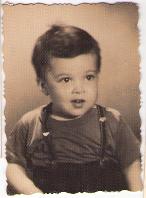
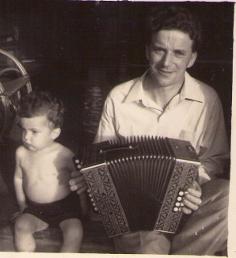
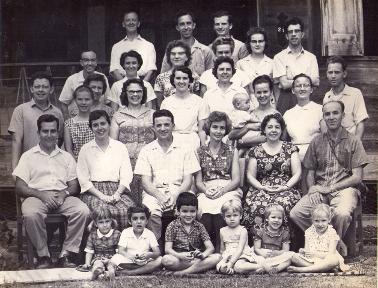
me
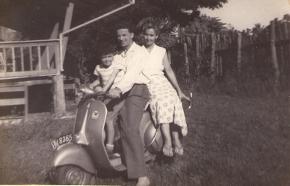
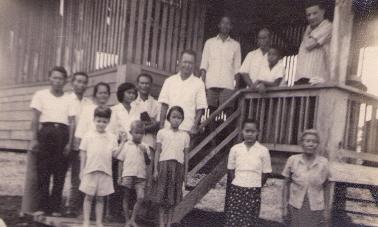
The Maesod church, near the Burma border. In those days, there was no highway connecting Maesod and the rest of the country, only a dirt road that was only wide enough to accommodate traffic to or from, depending on if it was an odd or even day -- or not at all during rainy season. There was a once a week flight, but sometimes the airstrip was too muddy for that, so we'd be stuck.
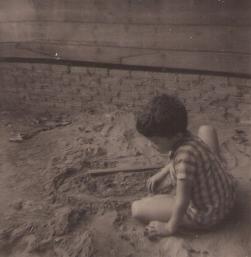
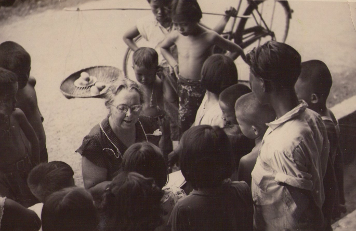
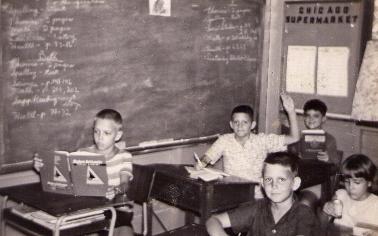
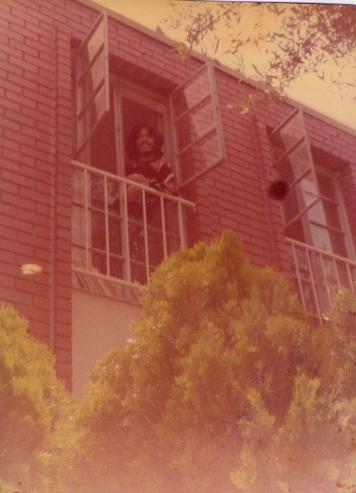
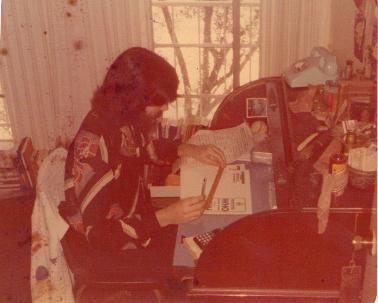
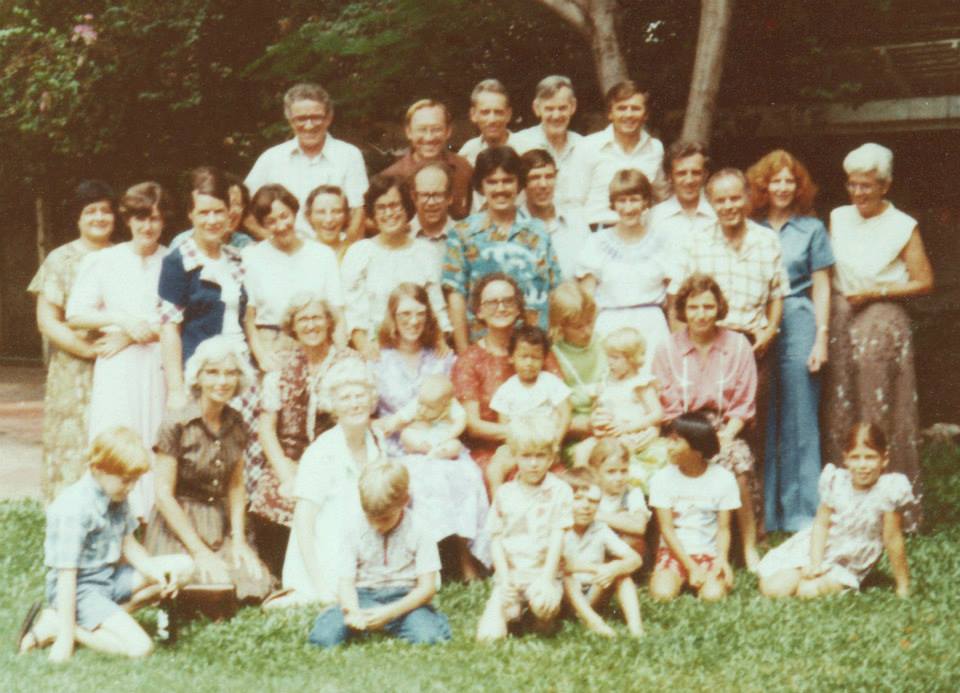
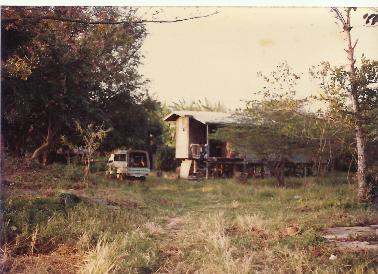
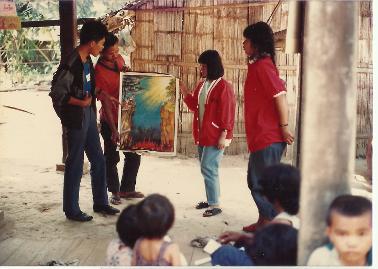
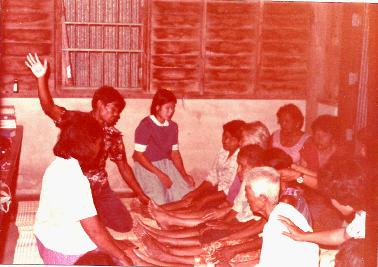
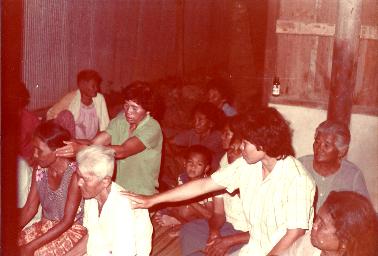
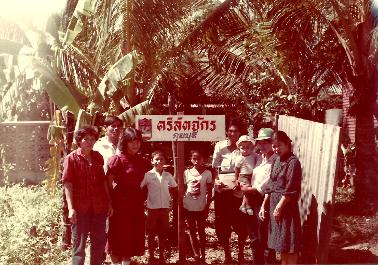
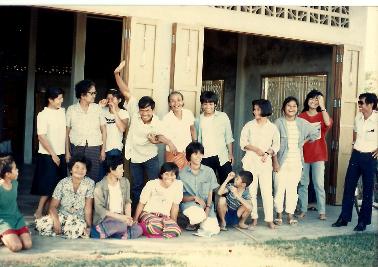
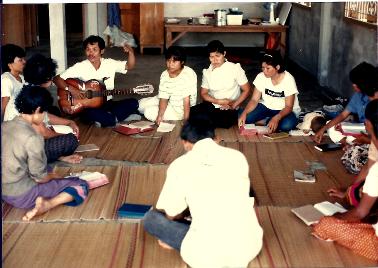
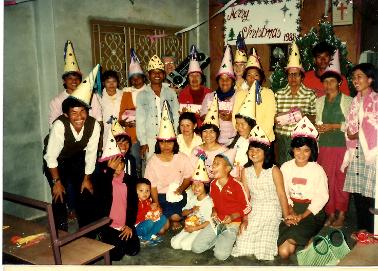
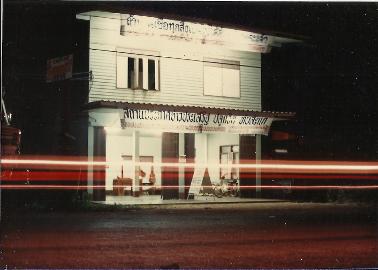
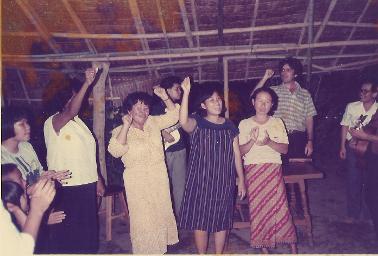
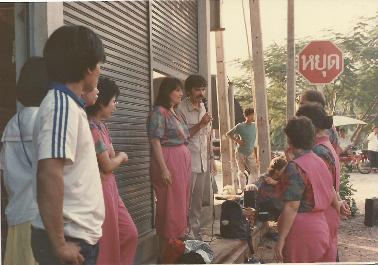
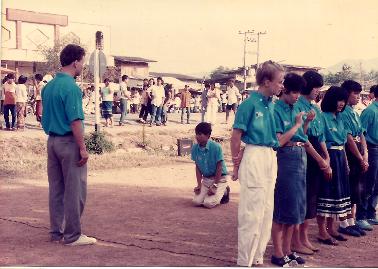
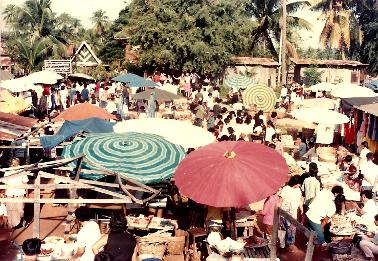
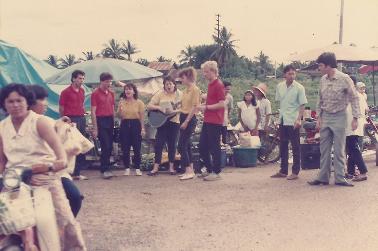
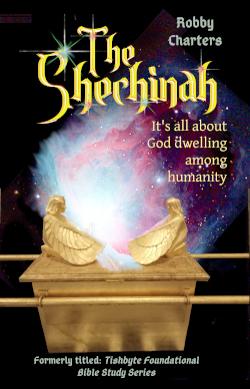
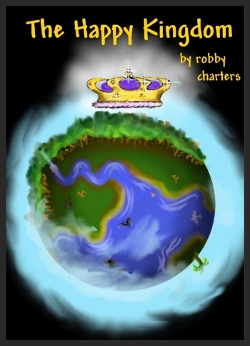
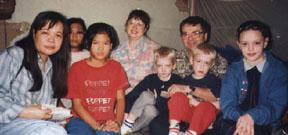
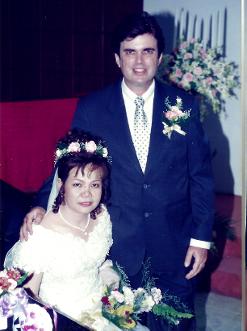

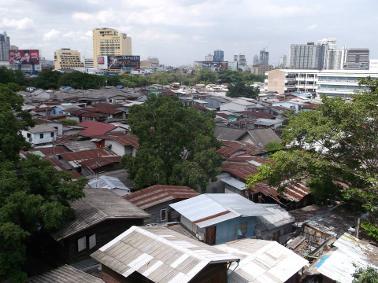
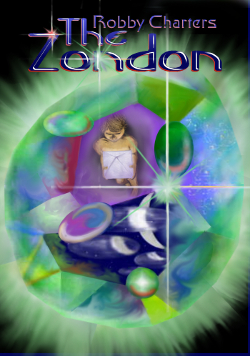

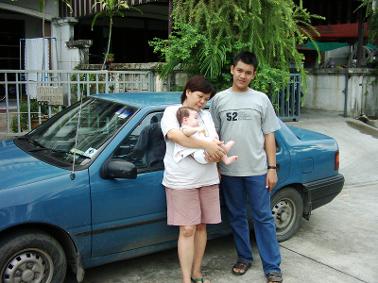

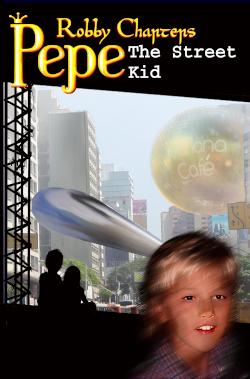
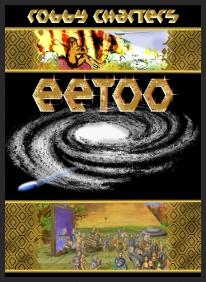
eBooks...
